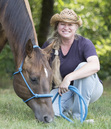Elena Hartwell's Blog, page 75
August 20, 2017
Lincoln, Lawyers, and Murder on the US Frontier: Author Jonathan F Putnam
 This week I'm hanging out with Jonathan F. Putnam, author of the Lincoln and Speed Mystery Series. Jonathan has been a trial lawyer in the New York City office of the international law firm of Kirkland & Ellis LLP since 1993. He specializes in representing companies and individuals in complex commercial litigation, often disputes involving intellectual property such as patents or trademarks.
This week I'm hanging out with Jonathan F. Putnam, author of the Lincoln and Speed Mystery Series. Jonathan has been a trial lawyer in the New York City office of the international law firm of Kirkland & Ellis LLP since 1993. He specializes in representing companies and individuals in complex commercial litigation, often disputes involving intellectual property such as patents or trademarks.
Jonathan graduated from Harvard College in 1988 with honors with a degree in History and graduated magna cum laude from Harvard Law School in 1992. At Harvard Law School, he served on the Harvard Law Review and received the Fay Diploma for graduating first in his class. After graduation he worked as a law clerk to a judge on the U.S. Court of Appeals in Washington D.C. for a year before joining Kirkland & Ellis.
Despite being a "debut" author, Jonathan is well into his third novel. To learn more about Jonathan F. Putnam and his books, sign up for his newsletter on his Website.
Follow on Twitter
Find him on Facebook
THE INTERVIEW
Lawyer, author, father, marathon runner ... How do you balance everything you do?
While I’m still ‘of counsel’ to my law firm, Kirkland & Ellis LLP, I spend the vast majority of my professional time at this point on my writing career. It’s much easier to balance everything now than it was when I was a full-time partner at a large New York City law firm, routinely working 60 hours or more a week and traveling around the country for hearings and trials.In fact, I spent about four years trying to write my first novel while still working as a full-time law partner. One of my writing heroes is Scott Turow, and he famously wrote his first blockbuster Presumed Innocent while commuting on the commuter rail train in Chicago, a little bit each morning and a little bit each evening. I was also riding a commuter rail train every day (into New York City) and I figured that if I followed Turow’s example, after a couple of years I’d have my own Presumed Innocent. Instead, after three or four years, I had about five pages, total, of incoherent scribbles. It wasn’t until I took a leave of absence from my firm that I found the time and mental bandwidth to make real progress on my story.Most of the published authors I’ve come to know still have a day job in addition to their successful writing career. I don’t know how they balance everything. I am in awe of them. You have a degree in history and a law degree. Those explain your facility with combining history and a character who is a lawyer, but why focus on Abraham Lincoln? What about that specific person and time period piqued your interest?Since I’ve always loved history, and the time-honored advice “write what you know” seemed sensible, when I first had the idea to write a novel I immediately thought about writing a law-related historical fiction. I needed a famous lawyer from history to be my protagonist. After several weeks of looking into various notable lawyers from the past, I settled upon Lincoln, who was a prolific trial lawyer long before he became the President who ended slavery and won the Civil War.
Lincoln is an iconic figure of lasting interest to the reading public. Better still, for my purposes, while many aspects of his Presidential career are well-known, the two prior decades in which he toiled as a private trial lawyer in central Illinois are much less so. The relative obscurity of this period gave me some historical maneuvering room to cook up compelling historical fiction. And as a defense lawyer representing someone accused of a crime, Lincoln was well positioned to be the protagonist in a murder mystery, solving crimes in course of his legal work.
In real life, Lincoln shared a room in Springfield, IL from 1837 to 1841 with Joshua Speed, the second son of a wealthy, large slave-owning family from Louisville, KY. Speed is Watson to Lincoln’s Holmes in my series: the roommate and best friend of the great man (in real life as in fiction), the sparring partner and investigative sidekick, and the narrator of the books.
My series is set during this period when they actually lived together, which is a fascinating but little known period of American history, especially on the frontier where they lived. Life was hard, and people died from all sorts of natural and unnatural causes (good for the mystery writer!). The nation was riven by slavery – Illinois was a nominally free state but a virulently racist and strongly pro-slavery one – but the national conflict was still several decades from coming to a head. Transportation and communication technology were just starting to change the way of life: for example, steamboats had recently revolutionized trade and travel along the Mississippi, but it would be a number of years still until the railroad, to say nothing of the telegraph, reached Springfield.
How does splitting your time between the US (New York City) and England (London) impact your view of the world?
London is an amazing world city with fantastic culture, unmatched history, and a vibrant writing scene. I’ve found it a very creative place in which to write.
London has also proven unexpectedly relevant to my books, even though they’re set on the American frontier of the mid-19thcentury. My latest book, Perish from the Earth , is set along the Mississippi River in 1837, when the great river was the western edge of the frontier of our young country. London has a fantastic series of canals left over from the early Industrial Revolution. These days the canals are used for recreation, and a number of people also live “off the grid” in houseboats moored to the side of the waterways.
I spend a lot of time running or bike riding with my youngest son along the canal towpaths. One day I was biking along, watching people smoking and drinking, loving and fighting, and it hit me: if you abstract away the 21st century technology (iPhones, etc.), the London canals of the 2010s and the people who live and work along them perfectly recreate life along the Mississippi River of the 1830s.
What kind of research did you do (and continue to do) for your series? Original documents? Non-fiction? Do you visit the locations?
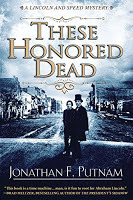 My books are the product of substantial original historical research. I’ve visited the locations where my books are set; read lots of documents from Lincoln’s real-life legal cases; read innumerable first-person accounts from the 19thcentury about Lincoln; read the substantial extant correspondence between Lincoln and Speed and other members of Speed’s family, and conducted additional original research on Speed, who is a much less well known figure in history.
My books are the product of substantial original historical research. I’ve visited the locations where my books are set; read lots of documents from Lincoln’s real-life legal cases; read innumerable first-person accounts from the 19thcentury about Lincoln; read the substantial extant correspondence between Lincoln and Speed and other members of Speed’s family, and conducted additional original research on Speed, who is a much less well known figure in history.One set of sources in particular that I’ve mined are contemporaneous travel diaries. Westerners at the time, like Lincoln and Speed, were mostly concerned with survival. Life on the frontier was hard. They tended not to write down a lot about their everyday lives. But lots of Easterners and Europeans traveled to the Mississippi River Valley to see first-hand what was then the “Wild West”. It was sort of the European Grand Tour in reverse. Many of these travelers kept diaries, and I’ve tracked a lot of them down. They provide an unmatched record of the details of daily life on the frontier in the 1830s, and I’ve relied on them to create in my books what I think is a very realistic portrait of Lincoln & Speed’s life and times.
How did the experience differ for you in writing your first, second, and now third book in the series?
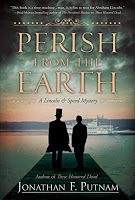 On the good side, it’s a completely different experience writing a book when you know you already have a publisher. In that way, the second and third, etc., books in the series are much more … comfortable, I suppose – to write. Put differently, I worry as I’m trying to fall asleep about making the books as good as possible, but I don’t worry about having to sell them.
On the good side, it’s a completely different experience writing a book when you know you already have a publisher. In that way, the second and third, etc., books in the series are much more … comfortable, I suppose – to write. Put differently, I worry as I’m trying to fall asleep about making the books as good as possible, but I don’t worry about having to sell them.The flip side – and this is a problem I’m thrilled to have – is the multi-tasking. I spent the past twelve months promoting my first book, These Honored Dead (which was published in August 2016); working with my publisher on the final edits and production of my second book, Perish from the Earth(published last month), and doing the actual writing of my third book, Final Resting Place (due to my publisher next month). So I’ve been working on three books simultaneously, each in a different stage of the publication process. Again, I’m very lucky to have this situation, but it can be a little head-spinning sometimes.
What are you working on now?
I’m very excited that my publisher, CrookedLane Books in New York, is continuing with the Lincoln & Speed series. I am just about finished with the manuscript for book 3, Final Resting Place, which will be published in the summer of 2018. Then I’ll be turning my attention to book 4. I have a pretty good idea about what the story will be (hint: Mary Todd will play a large role), but I have yet to put pen to paper. Book 4 should appear in stores in the summer of 2019.
Final Words of Wisdom:
A friend of mine who’s an independent movie director has a great saying: It’s always ‘no’ until it’s ‘yes’. Or, put differently, as a writer you need to be wired to hear ‘no’ as ‘not yet’. It’s contrary to our usual experience, but you need to take ‘no’ as encouragement – someone actually cared enough to respond to you! – and to push ahead.
My own path to publication illustrates this exactly. My agent sent my first Lincoln & Speed manuscript around to about two dozen publishing houses. All of them said ‘no.’ But one of them said, ‘no, but we do really like this idea of young Lincoln as told by his best friend Speed,’ and the acquiring editor there worked with me for several months on different rounds of edits. In the end, they passed. My agent told me he’d never had a house spend so much time working with an unpublished author before passing, a statement that simultaneously made me pretty good and absolutely terrible.
I spent another year writing a new Lincoln & Speed book. A few months after I’d finished, my agent happened to have lunch with that same acquiring editor, who was now running his own publishing house (Crooked Lane Books). The editor asked about me, and my agent sent him the new book. A few weeks later, I heard back, ‘no, but you’re getting closer,’ and the editor attached three pages of very helpful, very detailed notes. He also invited me to follow up with him directly, although when I did he never returned my calls or emails. Nonetheless, I spent another year rewriting the second book in response to the notes. Three weeks after I submitted the new manuscript, the editor called to offer me a two-book contract.
So, depending on how you count, my current publisher himselfsaid ‘no’ to me four or five times before he said ‘yes’. It’s always ‘no’ until it’s ‘yes’. Keep writing!
Finally, it takes a village to make a successful book series, I hope you'll join me on social media.
Thanks for joining me this week Jonathan! I'll be seeing you on Twitter and Facebook!
Published on August 20, 2017 00:00
August 13, 2017
Writing Dark Thrillers: Debut Author S. A. Stovall
This week I get to hang out with ITW Debut Author S.A. Stovall. Her first novel, Vice City is available on Amazon, Barnes & Nobel and DSP Publications.
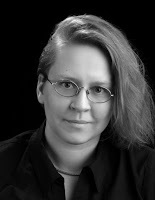 S.A. Stovall grew up in California’s central valley with a single mother and little brother. Despite no one in her family having a degree higher than a GED, she put herself through college (earning a BA in History), and then continued on to law school where she obtained her Juris Doctorate.
S.A. Stovall grew up in California’s central valley with a single mother and little brother. Despite no one in her family having a degree higher than a GED, she put herself through college (earning a BA in History), and then continued on to law school where she obtained her Juris Doctorate.
As a child, Stovall’s favorite novel was Island of the Blue Dolphins by Scott O’Dell. The adventure on a deserted island opened her mind to ideas and realities she had never given thought before—and it was the moment Stovall realized that story telling (specifically fiction) became her passion. Anything that told a story, be it a movie, book, video game or comic, she had to experience. Now, as a professor and author, Stovall wants to add her voice to the myriad of stories in the world, and she hopes you enjoy.
To learn more about S.A, follow her on Twitter @GameOverStation
THE INTERVIEW
In addition to being a debut author, you went to law school and teach history. How do those three things intersect?
First off, having a law degree and a history degree help me craft stories, especially for thrillers (which often have a legal aspect to them) and sci-fi-fantasy (as worldbuilding draws a lot from human history). I want to thank all my professors over the years for their insights and knowledge. It’s because of them that I can do what I love.
Secondly, teaching history at a college level helps me interact with people I otherwise would never meet. I see people from all walks of life and understanding them helps craft believable characters in my stories.
Overall, my knowledge and experience is the foundation from which I build each new tale.
Tell us about your path to publication.
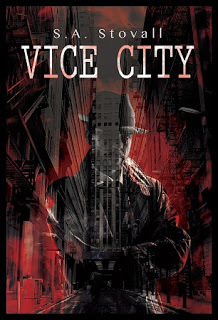 My path to publication is a traditional one, I think. Well, as traditional as you can get in an industry where every path to publication is a viable one.
My path to publication is a traditional one, I think. Well, as traditional as you can get in an industry where every path to publication is a viable one.
I wrote several novels (epic fantasy, 240k+ words) before my friends convinced me to pursue a path in publishing. Once I decided, I went to a few writing conventions and learned the ins and outs of industry. Specifically, I learned what agents are looking for, what editors are looking for, how to craft an engaging query letter, and to how to engage the audience from the first page.
After that, I wrote a few more novels (Stephen King famously said you need to get a few million terrible words out of your system before you write anything worth reading) and managed to gain the interest of several agents. The agent I signed with really liked my debut novel, VICE CITY, and I signed with him after talking about it with my family. (Shout out to Evan Marshall, who is awesome—check him out if you’re looking for an agent!)
Since then, he’s sold two novels for me, and continues to take my new novels (commenting on them when I need to change something, and offering up praise when he thinks they work) so I love working with him.
Along the way I sold a few short stories and novellas, but novels are my passion and I focus my efforts on those more than others.
What kind of research did you do for your debut novel?
I read up on Chicago for a long period of time. I was originally going to set the novel there, but after some consideration I opted for a fictional city instead. That way if I had corrupt cops, or lots of gang activity, I wouldn’t be insulting the men-in-blue of Chicago, nor would I be making light of the actual gang violence that happens in Chicago on a daily basis. Additionally, I have more freedom with the layout, population, and industries, all of which helps me craft interesting stories.
I have the legal stuff down, and I know a fair deal about guns, so my primary area of research was the city itself (which is darker version of the real-world Chicago).
You write in first person, present tense. What made you choose that style?
I like first person, present tense because it feels more immediate—the action is happening right now, this isn’t a story that happened years ago.
Additionally, first person is great if the main character has a lot of voice and personality. Their attitude colors the whole feel of the novel. A story told by a jaded old veteran feels a lot different than a story told by a wide-eyed high school student, that’s for sure, and my protagonist is a guy with a lot of colorful things to say about the world.
And since my novel, VICE CITY, is more of a noir novel, it’s fitting that’s it’s told from the viewpoint of a single person, rather than a detached third person narrator.
Your writing is dark and violent, how do you get yourself into that mindset? (I often think I should learn to write darker!)
I love books with a solid tone. I love it so much I even wrote an article on it for The Thrill Begins! "How Do I Write Tone?"
And dark/gritty settings are some of my favorite in terms of tone. Maybe it’s because I live a happy life with friends and family that I enjoy seeing darkness in my entertainment. It’s a world and setting I would never want to personally live in, but stakes are high and the consequences dire. That kind of excitement gets my heart rate up, even if I’m just reading a book.
I get myself into this mindset usually through other mediums—old gangster movies, comic books with hard grit, or even music with a melancholy melody. These sources of inspiration get me thinking about the darkness that dwells in all corners of life.
I almost always end on a happy note, however. Almost.
But the happy ending feels earned when the protagonist goes through so much to reach it. It’s the best way to end to a sprint through a gritty crime thriller!
What are you working on now?
Right now I’m working on a sci-fi adventure novel. Science-fiction is my first love—all my favorite books fall into that category—and I think I’m always going to write in that genre, even if I continue with my thriller series.
Final words of wisdom:
Don’t stop writing.
I got tons of rejections out the door, which is a common story among writers. If you continue to write, you’ll get better, which increases your chances of getting noticed, which increases your chances of succeeding. If you stop, all your chances fall to 0, so persevere!
You can do it!
 S.A. Stovall grew up in California’s central valley with a single mother and little brother. Despite no one in her family having a degree higher than a GED, she put herself through college (earning a BA in History), and then continued on to law school where she obtained her Juris Doctorate.
S.A. Stovall grew up in California’s central valley with a single mother and little brother. Despite no one in her family having a degree higher than a GED, she put herself through college (earning a BA in History), and then continued on to law school where she obtained her Juris Doctorate. As a child, Stovall’s favorite novel was Island of the Blue Dolphins by Scott O’Dell. The adventure on a deserted island opened her mind to ideas and realities she had never given thought before—and it was the moment Stovall realized that story telling (specifically fiction) became her passion. Anything that told a story, be it a movie, book, video game or comic, she had to experience. Now, as a professor and author, Stovall wants to add her voice to the myriad of stories in the world, and she hopes you enjoy.
To learn more about S.A, follow her on Twitter @GameOverStation
THE INTERVIEW
In addition to being a debut author, you went to law school and teach history. How do those three things intersect?
First off, having a law degree and a history degree help me craft stories, especially for thrillers (which often have a legal aspect to them) and sci-fi-fantasy (as worldbuilding draws a lot from human history). I want to thank all my professors over the years for their insights and knowledge. It’s because of them that I can do what I love.
Secondly, teaching history at a college level helps me interact with people I otherwise would never meet. I see people from all walks of life and understanding them helps craft believable characters in my stories.
Overall, my knowledge and experience is the foundation from which I build each new tale.
Tell us about your path to publication.
 My path to publication is a traditional one, I think. Well, as traditional as you can get in an industry where every path to publication is a viable one.
My path to publication is a traditional one, I think. Well, as traditional as you can get in an industry where every path to publication is a viable one. I wrote several novels (epic fantasy, 240k+ words) before my friends convinced me to pursue a path in publishing. Once I decided, I went to a few writing conventions and learned the ins and outs of industry. Specifically, I learned what agents are looking for, what editors are looking for, how to craft an engaging query letter, and to how to engage the audience from the first page.
After that, I wrote a few more novels (Stephen King famously said you need to get a few million terrible words out of your system before you write anything worth reading) and managed to gain the interest of several agents. The agent I signed with really liked my debut novel, VICE CITY, and I signed with him after talking about it with my family. (Shout out to Evan Marshall, who is awesome—check him out if you’re looking for an agent!)
Since then, he’s sold two novels for me, and continues to take my new novels (commenting on them when I need to change something, and offering up praise when he thinks they work) so I love working with him.
Along the way I sold a few short stories and novellas, but novels are my passion and I focus my efforts on those more than others.
What kind of research did you do for your debut novel?
I read up on Chicago for a long period of time. I was originally going to set the novel there, but after some consideration I opted for a fictional city instead. That way if I had corrupt cops, or lots of gang activity, I wouldn’t be insulting the men-in-blue of Chicago, nor would I be making light of the actual gang violence that happens in Chicago on a daily basis. Additionally, I have more freedom with the layout, population, and industries, all of which helps me craft interesting stories.
I have the legal stuff down, and I know a fair deal about guns, so my primary area of research was the city itself (which is darker version of the real-world Chicago).
You write in first person, present tense. What made you choose that style?
I like first person, present tense because it feels more immediate—the action is happening right now, this isn’t a story that happened years ago.
Additionally, first person is great if the main character has a lot of voice and personality. Their attitude colors the whole feel of the novel. A story told by a jaded old veteran feels a lot different than a story told by a wide-eyed high school student, that’s for sure, and my protagonist is a guy with a lot of colorful things to say about the world.
And since my novel, VICE CITY, is more of a noir novel, it’s fitting that’s it’s told from the viewpoint of a single person, rather than a detached third person narrator.
Your writing is dark and violent, how do you get yourself into that mindset? (I often think I should learn to write darker!)
I love books with a solid tone. I love it so much I even wrote an article on it for The Thrill Begins! "How Do I Write Tone?"
And dark/gritty settings are some of my favorite in terms of tone. Maybe it’s because I live a happy life with friends and family that I enjoy seeing darkness in my entertainment. It’s a world and setting I would never want to personally live in, but stakes are high and the consequences dire. That kind of excitement gets my heart rate up, even if I’m just reading a book.
I get myself into this mindset usually through other mediums—old gangster movies, comic books with hard grit, or even music with a melancholy melody. These sources of inspiration get me thinking about the darkness that dwells in all corners of life.
I almost always end on a happy note, however. Almost.
But the happy ending feels earned when the protagonist goes through so much to reach it. It’s the best way to end to a sprint through a gritty crime thriller!
What are you working on now?
Right now I’m working on a sci-fi adventure novel. Science-fiction is my first love—all my favorite books fall into that category—and I think I’m always going to write in that genre, even if I continue with my thriller series.
Final words of wisdom:
Don’t stop writing.
I got tons of rejections out the door, which is a common story among writers. If you continue to write, you’ll get better, which increases your chances of getting noticed, which increases your chances of succeeding. If you stop, all your chances fall to 0, so persevere!
You can do it!
Published on August 13, 2017 00:00
August 6, 2017
From Television News to Debut Novelist, Christina Kovac launches The Cutaway
On this very smoky Sunday (for those of us in the Pacific Northwest...) I bring you Christina Kovak! Debut author of The Cutaway.
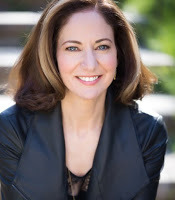 Prior to writing fiction, Christina Kovac worked in television news. Her career began with a college internship at Fox 5’s Ten O’Clock News in DC that turned into a field-producing job—making minimum wage while chasing news stories, gossiping with press officers, and cultivating sources—while somehow making rent on a closet-sized apartment on Capitol Hill. After a stint as weekend editor at WRC TV and senior editor at the ABC affiliate, she went on to work at the Washington Bureau of NBC Network News, as a desk editor and news producer in such stories as that of missing DC intern, Chandra Levy.
Prior to writing fiction, Christina Kovac worked in television news. Her career began with a college internship at Fox 5’s Ten O’Clock News in DC that turned into a field-producing job—making minimum wage while chasing news stories, gossiping with press officers, and cultivating sources—while somehow making rent on a closet-sized apartment on Capitol Hill. After a stint as weekend editor at WRC TV and senior editor at the ABC affiliate, she went on to work at the Washington Bureau of NBC Network News, as a desk editor and news producer in such stories as that of missing DC intern, Chandra Levy.
To learn more about Christina, visit her on Social Media:
@Christina_Kovac
Facebook
Instagram
Goodreads
THE INTERVIEW
You've spent years working in television news, how did that prepare you to write a novel?
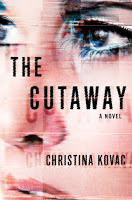 Writing a novel and working on a two-minutes story with video are such entirely different beasts, and none of my friends in TV could understand why it was taking me so long. Our deadline was always 6:30:00. Every night. The show had to get done.
Writing a novel and working on a two-minutes story with video are such entirely different beasts, and none of my friends in TV could understand why it was taking me so long. Our deadline was always 6:30:00. Every night. The show had to get done.
One of my friends used to joke that he’d use his social security payment as a book marker for whenever I finished my debut (I got it done before his retirement, so ha! But long after the many stories he wrote for the Todayshow).
That said, working television news gave me stories that somehow weave together into novel form, as well as opportunities to observe and talk to people I may never have met otherwise, and these people sneak up on the page. The DC metropolitan area is so vibrant and diverse, so beautiful and misunderstood, and sometimes quite dangerous, which is perfect for fiction.
What's it like balancing family, writing, and promotion of your debut novel?
Oh, you know, it’s a breeze. I get up before sunrise and churn out thousands of words before my 5K run and do some afternoon social media postings and blogs, etc., as I cook a gourmet dinner for my family every night.
Just kidding! (Although that’s the actual schedule of a writer-friend of mine who’s on her sixth book). My life? Every day is a triage situation.
I write during the day, mostly when my family is at work or school, but the work often bleeds over into the evening hours. I’m lucky that we’re all supportive of each other’s work and studies and activities, etc. When they see me at the desk (like now), they know to approach slowly, quietly, until I lift my head and make eye contact. Sometimes, if I’m deep in a scene, I wear big blue Bose headphones, so they know it’s dangerous to approach. Other times, I just growl.
Other times, I just growl.
I don’t remember anything about the month before and after the launch, except we kept running out of clean towels. Finally, I ordered a dozen more towels.
For the next book launch, I’ll make sure we’re stocked up on socks, too. (Excellent planning and foresight)
Tell us about your writing process.
I’m still figuring it out. THE CUTAWAY was written on pure adrenaline. Like most debut novelists, I had no idea what I was doing, only that I had to get some of the awful news stories out of my head and onto a page, in some form. Book Two is entirely different. I’m more relaxed. I know I can finish a book, and I know what the book needs, although the big fight now is to meet deadline.
So, I tried this: I wrote an incredibly bad first draft as quickly as I could to feel the form of the novel and see the characters and how they interacted and where the beats are and how it all ends. Now that I have an ending, I know what I need, and can write the scenes.
Knock on wood. This feels like it’s working. (Fingers crossed for you!)
How has news coverage of politics in Washington DC changed over the years?
This is a great question, but two things: I haven’t worked in television since the Obama administration, so I’m not in the muck of news now. Also, it appears that the ground is still shifting, and everything still changing, and hard to say, day-to-day, what anyone will face when they hoist a camera over their shoulder. It seems like anything can happen. Who knows?
There was always gamesmanship in the way the press and official Washington dealt with each other, but recently, the relationship has become surprisingly antagonistic. Basic facts have become a point of debate, which is sort of crazy, if you ask me.
Public information generally provided by government institutions (under the law) is harder to access, if at all, and a lot of the information that is released often has a fog of war feel to it. Quite a bit of misdirection, spin, and dishonesty, from what I can see. This makes newsgathering a free for all of leaks, which results in government countermeasures against leaks, and networks and newspapers digging in and pushing harder.
But look, there are still very good people on both sides—government and press—that care about their work and our country, and the good journalists will do their job, despite the obstacles. They have to. For many of them, their job is who they are. (Great point. I think we forget this sometimes.)
The Cutaway has been out since March, what has been the biggest surprise launching your first novel?
The voice of the main character, Virginia Knightly, had been so loud in my head for so long, I felt so attached. Like I could never leave her. I was so obsessed with her voice and her life and her loves and hates and all the terrible plot points I threw at her. But now, I’ve forgotten it all. I might write about the book in a blog, or talk about her at events, but it’s all very distant to me. Her voice is gone, too. These new characters are taking up my full bandwidth.
What are you working on now?
Another standalone that takes place in present-day DC, this time of a young woman who’s been accused of a crime she says she didn’t commit. Same world of story with police, lawyers and politicians, journalists, etc. That’s my playground, I suppose.

Final words of wisdom:
When you’re alone in a room writing that difficult manuscript: The first couple of times through the manuscript takes grit in search of a little flow, and honestly, you’re going to have to depend on grit more than flow.
Once you publish: Know that your book is neither as good or as bad as anyone says, and in many ways, approval and criticism are both beside the point. That book’s already written. Nothing you can do now. The real goal is to create a body of work. To do that, work hard every day.
Thanks for hanging out with me on my blog, Christina. Hope to see you soon!
 Prior to writing fiction, Christina Kovac worked in television news. Her career began with a college internship at Fox 5’s Ten O’Clock News in DC that turned into a field-producing job—making minimum wage while chasing news stories, gossiping with press officers, and cultivating sources—while somehow making rent on a closet-sized apartment on Capitol Hill. After a stint as weekend editor at WRC TV and senior editor at the ABC affiliate, she went on to work at the Washington Bureau of NBC Network News, as a desk editor and news producer in such stories as that of missing DC intern, Chandra Levy.
Prior to writing fiction, Christina Kovac worked in television news. Her career began with a college internship at Fox 5’s Ten O’Clock News in DC that turned into a field-producing job—making minimum wage while chasing news stories, gossiping with press officers, and cultivating sources—while somehow making rent on a closet-sized apartment on Capitol Hill. After a stint as weekend editor at WRC TV and senior editor at the ABC affiliate, she went on to work at the Washington Bureau of NBC Network News, as a desk editor and news producer in such stories as that of missing DC intern, Chandra Levy.
To learn more about Christina, visit her on Social Media:
@Christina_Kovac
Goodreads
THE INTERVIEW
You've spent years working in television news, how did that prepare you to write a novel?
 Writing a novel and working on a two-minutes story with video are such entirely different beasts, and none of my friends in TV could understand why it was taking me so long. Our deadline was always 6:30:00. Every night. The show had to get done.
Writing a novel and working on a two-minutes story with video are such entirely different beasts, and none of my friends in TV could understand why it was taking me so long. Our deadline was always 6:30:00. Every night. The show had to get done. One of my friends used to joke that he’d use his social security payment as a book marker for whenever I finished my debut (I got it done before his retirement, so ha! But long after the many stories he wrote for the Todayshow).
That said, working television news gave me stories that somehow weave together into novel form, as well as opportunities to observe and talk to people I may never have met otherwise, and these people sneak up on the page. The DC metropolitan area is so vibrant and diverse, so beautiful and misunderstood, and sometimes quite dangerous, which is perfect for fiction.
What's it like balancing family, writing, and promotion of your debut novel?
Oh, you know, it’s a breeze. I get up before sunrise and churn out thousands of words before my 5K run and do some afternoon social media postings and blogs, etc., as I cook a gourmet dinner for my family every night.
Just kidding! (Although that’s the actual schedule of a writer-friend of mine who’s on her sixth book). My life? Every day is a triage situation.
I write during the day, mostly when my family is at work or school, but the work often bleeds over into the evening hours. I’m lucky that we’re all supportive of each other’s work and studies and activities, etc. When they see me at the desk (like now), they know to approach slowly, quietly, until I lift my head and make eye contact. Sometimes, if I’m deep in a scene, I wear big blue Bose headphones, so they know it’s dangerous to approach.
 Other times, I just growl.
Other times, I just growl. I don’t remember anything about the month before and after the launch, except we kept running out of clean towels. Finally, I ordered a dozen more towels.
For the next book launch, I’ll make sure we’re stocked up on socks, too. (Excellent planning and foresight)
Tell us about your writing process.
I’m still figuring it out. THE CUTAWAY was written on pure adrenaline. Like most debut novelists, I had no idea what I was doing, only that I had to get some of the awful news stories out of my head and onto a page, in some form. Book Two is entirely different. I’m more relaxed. I know I can finish a book, and I know what the book needs, although the big fight now is to meet deadline.
So, I tried this: I wrote an incredibly bad first draft as quickly as I could to feel the form of the novel and see the characters and how they interacted and where the beats are and how it all ends. Now that I have an ending, I know what I need, and can write the scenes.
Knock on wood. This feels like it’s working. (Fingers crossed for you!)
How has news coverage of politics in Washington DC changed over the years?
This is a great question, but two things: I haven’t worked in television since the Obama administration, so I’m not in the muck of news now. Also, it appears that the ground is still shifting, and everything still changing, and hard to say, day-to-day, what anyone will face when they hoist a camera over their shoulder. It seems like anything can happen. Who knows?
There was always gamesmanship in the way the press and official Washington dealt with each other, but recently, the relationship has become surprisingly antagonistic. Basic facts have become a point of debate, which is sort of crazy, if you ask me.
Public information generally provided by government institutions (under the law) is harder to access, if at all, and a lot of the information that is released often has a fog of war feel to it. Quite a bit of misdirection, spin, and dishonesty, from what I can see. This makes newsgathering a free for all of leaks, which results in government countermeasures against leaks, and networks and newspapers digging in and pushing harder.
But look, there are still very good people on both sides—government and press—that care about their work and our country, and the good journalists will do their job, despite the obstacles. They have to. For many of them, their job is who they are. (Great point. I think we forget this sometimes.)
The Cutaway has been out since March, what has been the biggest surprise launching your first novel?
The voice of the main character, Virginia Knightly, had been so loud in my head for so long, I felt so attached. Like I could never leave her. I was so obsessed with her voice and her life and her loves and hates and all the terrible plot points I threw at her. But now, I’ve forgotten it all. I might write about the book in a blog, or talk about her at events, but it’s all very distant to me. Her voice is gone, too. These new characters are taking up my full bandwidth.
What are you working on now?
Another standalone that takes place in present-day DC, this time of a young woman who’s been accused of a crime she says she didn’t commit. Same world of story with police, lawyers and politicians, journalists, etc. That’s my playground, I suppose.

Final words of wisdom:
When you’re alone in a room writing that difficult manuscript: The first couple of times through the manuscript takes grit in search of a little flow, and honestly, you’re going to have to depend on grit more than flow.
Once you publish: Know that your book is neither as good or as bad as anyone says, and in many ways, approval and criticism are both beside the point. That book’s already written. Nothing you can do now. The real goal is to create a body of work. To do that, work hard every day.
Thanks for hanging out with me on my blog, Christina. Hope to see you soon!
Published on August 06, 2017 00:00
July 30, 2017
Filmmaking, Novel Writing, and Surviving the Yukon in Winter: Author Elle Wild
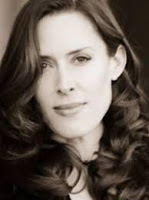 This week, continuing my series on the authors in this year's Debut Author Program through the International Thriller Writers, I'm heading north of the border. The Canadian border that is.
This week, continuing my series on the authors in this year's Debut Author Program through the International Thriller Writers, I'm heading north of the border. The Canadian border that is.
Elle Wild, author of the debut novel Strange Things Done, grew up in Canada and now lives on a tiny island in the Salish Sea. Well-traveled and well-read, Elle is no debut to storytelling, her career as a filmmaker continues alongside her novel writing. For more information about Elle, visit her on social media.
TWITTER @ElleWild_writer
THE INTERVIEW
You are also a filmmaker. How does telling stories with film differ from telling stories through novels (or fiction, since you also write short stories)?
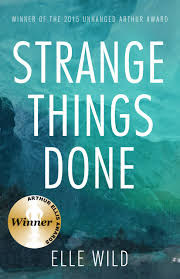 Oh, that’s a great question. I think the key thing is that you have to “show” more in a screenplay and “tell” less. In a film, you can’t necessarily access a character’s inner thoughts in the same way that you can in a novel (or short story), but you can use little visual clues about a character to give the audience a hint. For example, in the film Chinatown, we are shown Jake Gittes’ expensive shoes and well-tailored cream suit before he delivers the line, “I won’t take your last dime.” The viewer understands that Jake is lying. Of course, these kind of visual clues are well-employed by great fiction writers, too. The use of the colour green in F. Scott Fitzgerald’s The Great Gatsby comes to mind as a visual trigger for the theme of greed and the relentless pursuit of money. It’s clearly a story about class conflict and the American Dream gone wrong, and the imagery works to support that.
Oh, that’s a great question. I think the key thing is that you have to “show” more in a screenplay and “tell” less. In a film, you can’t necessarily access a character’s inner thoughts in the same way that you can in a novel (or short story), but you can use little visual clues about a character to give the audience a hint. For example, in the film Chinatown, we are shown Jake Gittes’ expensive shoes and well-tailored cream suit before he delivers the line, “I won’t take your last dime.” The viewer understands that Jake is lying. Of course, these kind of visual clues are well-employed by great fiction writers, too. The use of the colour green in F. Scott Fitzgerald’s The Great Gatsby comes to mind as a visual trigger for the theme of greed and the relentless pursuit of money. It’s clearly a story about class conflict and the American Dream gone wrong, and the imagery works to support that. The other thing that screenwriters have to think more about is the speed/tightness of the plot, of course. You have to work harder to find a clear “way in” to the story, and the story has to be delivered and wrapped up in something like 90-120 pages for a feature screenplay. I love Michael Ondaatje’s The English Patient, and it’s also one of my favourite films, but the focus in the story had to change when it was adapted for film. The film spends more time on the romance between Almásy and Katherine as the “A” plot than the novel does as a result.
Tell us about the island where you live. How does your geography impact your writing?
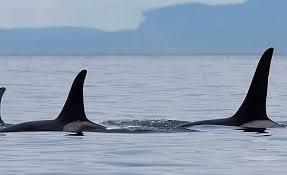 Currently I live on an island in the Salish Sea named after the bones of dead whales. It’s a tiny island, with four cafes and two grocery stores. Everyone knows everyone, and everyone’s business. When my debut novel was released, people in the grocery store would tell me what page they were on when I bumped into them in the produce section; it’s that kind of small.
Currently I live on an island in the Salish Sea named after the bones of dead whales. It’s a tiny island, with four cafes and two grocery stores. Everyone knows everyone, and everyone’s business. When my debut novel was released, people in the grocery store would tell me what page they were on when I bumped into them in the produce section; it’s that kind of small. The island may be miniscule, but the trees and the tales here are tall. There is always someone just back from swimming who knew someone who had to get out of the water before the orcas got too close. (And yes, we know that there has never been a documented case of orcas eating a human. That doesn’t mean we stay in the water once we see the dorsal fins.) People here are hugely into kayaking, and wait all year for the magical “bioluminescence nights” where the waters sparkle like the Northern lights and you can lift multitudes of tiny “stars” out of the sea with your paddle. I haven’t written about my island yet, but I’m sure I will. Eventually, everywhere I live gets under my skin and comes out in a story.
What draws you to small towns as a setting?
I find small towns fascinating because they present a double-edged sword of knowing your neighbours, but sometimes knowing too much about your neighbours, if you know what I mean. I love to figure out what makes people tick, and that’s much easier in a small town.
I’m a bit of a gypsy and like to move around a lot. This usually means that I’m looking into all of these small towns with a kind of a “window” perspective, peering in from the outside because I’m never around long enough to become fully a part of the community. The impermanence of my lifestyle coupled with the fact that I’m a writer who works from home, largely in isolation, probably contributes to the sense of distance that finds its way into my work. My protagonists are usually outsiders.
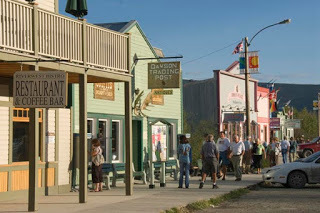 For example, I once spent a year in a small village in Japan, and that setting became the focus of my documentary film called Diary of an Alien. My time in Northern California in a town called Santa Cruz found its way into a short story called “California Pure” that was published this year in an anthology by the Canadian Author’s Association. My debut novel, Strange Things Done, was based on my time as an Artist in Residence in Dawson City, in the Yukon. I’m currently working on a Victorian thriller that is set in London and Dorset, based on the four years that I lived in the UK, (which I miss terribly – I’m a huge Britophile). I think what attracts me to small towns is the strong sense of community, and being part of the social fabric more so than an urban lifestyle. I’ve lived in cities, too, but I’m definitely finding myself returning to my rural roots – I grew up in the countryside in Canada where I spent my childhood fishing and reading. I love to be close to nature, and I love to write about it. I’ve always been very inspired by Thoreau.
For example, I once spent a year in a small village in Japan, and that setting became the focus of my documentary film called Diary of an Alien. My time in Northern California in a town called Santa Cruz found its way into a short story called “California Pure” that was published this year in an anthology by the Canadian Author’s Association. My debut novel, Strange Things Done, was based on my time as an Artist in Residence in Dawson City, in the Yukon. I’m currently working on a Victorian thriller that is set in London and Dorset, based on the four years that I lived in the UK, (which I miss terribly – I’m a huge Britophile). I think what attracts me to small towns is the strong sense of community, and being part of the social fabric more so than an urban lifestyle. I’ve lived in cities, too, but I’m definitely finding myself returning to my rural roots – I grew up in the countryside in Canada where I spent my childhood fishing and reading. I love to be close to nature, and I love to write about it. I’ve always been very inspired by Thoreau. The story in your novel is entwined with the natural world, did that come easily to you? Was that a conscious choice? Or was that something you deliberately set out to do?
The natural world is a very important part of my lifestyle, and I think a big part of the Canadian consciousness because it shapes who we are, particularly in the North. I don’t think you can write about the North in Canada without some kind of a man vs nature theme.
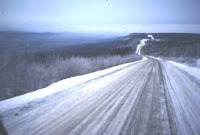 When I was an Artist in Residence in Dawson City (Yukon), I arrived just before freeze-up, when the ferry to West Dawson is dry-docked, the Top of the World Highway to Alaska closes, and the town becomes increasingly isolated as the main highway to the south, the Klondike, begins to snow over.
When I was an Artist in Residence in Dawson City (Yukon), I arrived just before freeze-up, when the ferry to West Dawson is dry-docked, the Top of the World Highway to Alaska closes, and the town becomes increasingly isolated as the main highway to the south, the Klondike, begins to snow over. At this point, the population of Dawson plummets with the temperatures. In summer, the population of Dawson is roughly 60,000, but by freeze-up, there are just over a 1,000 “sourdough” (people tough enough to survive the winter) left. Certainly that informed my story, and the feeling in Strange Things Done that the natural world is an antagonist and an obstacle that the characters must overcome, on top of everything else that’s going on.
Your style has been described as Nordic-style Noir ... what does that term mean to you? How would you define your writing style for your readers?
I can’t speak for others who might call my work “Nordic-style noir”, but to me, when I think “Nordic noir” I think of something that’s neo-noir in a Nordic setting. I also think of modern crimewriters like Jo Nesbo, Stieg Larsson and Peter Høeg. I particularly loved Høeg’s Smilla’s Senseof Snow and the way it (to quote the New York Times) approached “the suspense novel as exploration of the human heart”. I love the idea that “white” is the new black/noir, so in Nordic noir, the world of swirling snow is just as terrifying as the dreaded dark alley of classic noir.
I don’t know how I would define my writing for readers. The Toronto Star calls it, “The Girl on a Train meets Robert Service.” I think I prefer for readers to come with an open mind, lest they have unreasonable expectations for parallels. That said, I can see that, like Nordic noir, the northern setting in Strange Things Doneis an antagonist in its own right. I can also understand why people have compared Strange to the Icelandic TV series Trapped; both are about small communities in northern environments who are cut off from the rest of the world during winter storms.
What are you working on now?
Well, strangely enough, I’m still working on, Strange Things Done, even though it’s already been published as my debut novel. I won a screenwriting contest, blind-judged by Wes Craven (Scream, Nightmare on Elm Street), among others, for a screen adaptation of Strange Things Done. The contest, called “From Our Dark Side”, is run by Women in Film & Video Vancouver (WIFVV). The judges pick five winners, and then WIFVV supports these filmmakers with a 5-month film incubation program, including a professional story editor. I have been working with story editor Sara Snow (Artic Air, Little Mosque on the Prairie, Degrassi) on the screen adaptation of Strange. The whole experience culminates in all five women in the program pitching in front of an audience of producers at the FRONTIÈRES international film co-production market in Montreal, which just happened this past weekend. There are some exciting things going on behind the scenes as a result, but I can’t say too much about them yet. Please cross your fingers in the meantime!
The other things I’m working on are various literary short stories, (I’ve just been published in the National Capital Writing Contest’s 30th Anniversary Anthology) and my second novel, a Victorian thriller set in London and Dorset.
Final words of wisdom:
I would like to say to you that if you persevere, and edit ruthlessly, draft after draft after draft, you will get there in the end: I’m proof of that. In the words of Ira Glass, it’s going to take a while for your skill to catch up to your ambition and taste, and you just have to “fight your way through that.” Honestly, I feel like I’m still fighting my way through that.
Good luck!
Thanks Elle, for spending time with us on my blog!SaveSave
Published on July 30, 2017 00:00
July 24, 2017
NYC to Chincoteague: ThrillerFest and Ponies on the Water
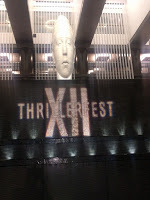 Whenever I travel for work, I try to take time to experience the places I go. It's easy to attend a conference and spend the entire weekend inside, soaking up amazing information and hearing from favorite authors, but disconnecting from the location where the event takes place. Left Coast Crime in Honolulu got me back in the islands, with a few added days in Kona. My whirlwind trip to Asheville, Hays, and West Palm Beach, included baby bears, a flood, and alligators. I'm happiest when I'm engaged with the natural world. ThrillerFest in New York City provided an amazing opportunity to hear from the top authors in my industry and to connect with other writers. It also got me on the east coast. From there it was a short hop to fulfill a childhood dream, to see the feral ponies of Chincoteague.
Whenever I travel for work, I try to take time to experience the places I go. It's easy to attend a conference and spend the entire weekend inside, soaking up amazing information and hearing from favorite authors, but disconnecting from the location where the event takes place. Left Coast Crime in Honolulu got me back in the islands, with a few added days in Kona. My whirlwind trip to Asheville, Hays, and West Palm Beach, included baby bears, a flood, and alligators. I'm happiest when I'm engaged with the natural world. ThrillerFest in New York City provided an amazing opportunity to hear from the top authors in my industry and to connect with other writers. It also got me on the east coast. From there it was a short hop to fulfill a childhood dream, to see the feral ponies of Chincoteague.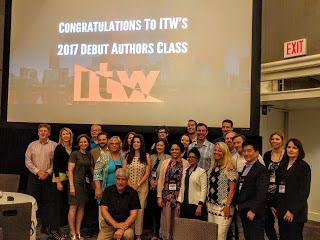 ThrillerFest was a very special event for me. As the Debut Author Program Chair, I got to interact with almost forty debut authors over the course of a year. Most of them have been featured on my blog and the rest will either have interviews or guest blogs posted through the end of September. Spending time with twenty-two of them in person was a wonderful experience. I loved having the opportunity to give back to ITW after my own fabulous debut year and I think I made a positive contribution to the experiences of these remarkable writers.
ThrillerFest was a very special event for me. As the Debut Author Program Chair, I got to interact with almost forty debut authors over the course of a year. Most of them have been featured on my blog and the rest will either have interviews or guest blogs posted through the end of September. Spending time with twenty-two of them in person was a wonderful experience. I loved having the opportunity to give back to ITW after my own fabulous debut year and I think I made a positive contribution to the experiences of these remarkable writers.As authors, we can feel isolated in our careers. We don't have a handbook about what to do after that first novel comes out. Building relationships with other authors provides us with advice, solace, and friendship with people who are experiencing many of the same highs, lows, and fears. I believe I've created connections that will last for the rest of my life. I think I was even more nervous this year than I was last year. Last year, all I had to do was show up. This year I felt (gasp, yikes) responsible for other people. Luckily, I was working with brilliant folks (you know who you are!) who made all the debut author events go without a hitch.
One of the highlights of the conference for me was Saturday night. I didn't go to the banquet and figured I'd spend that last night in NYC alone. Instead I went to dinner with four other writers from ITW. We went to Nirvana, an Indian Restaurant a few blocks from the Grand Hyatt. The food was terrific, but the conversation was the best part. I spend much of my life feeling like an outsider. I think many authors feel that way. We exist somewhere between our heads and our hearts and don't always know how to connect to people or feel that we "fit in." But our dinner felt like home—in the sense of breaking bread with kindred spirits. For a couple hours I felt like I belonged.
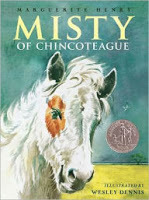 Sunday morning I left NYC behind on the road to Chincoteague. I've loved horses since I was two. My parents moved to a neighborhood in San Diego, where wild places still existed. Our house perched on a canyon, that at the time was undeveloped. A few blocks away was a horse stable, owned by a family named Ames. It had been there a long time and lasted until I was about ten. We would walk over to the stable—I often rode in the little red wagon my parents would pull—and feed carrots to the horses. I don't remember ever not being enthralled by a horse. At forty-eight, I still point and say "oh, look, a horse" whenever I see one from the car. Of course I read Misty of Chincoteague by Marguerite Henry. And I've wanted to see those feral ponies ever since.
Sunday morning I left NYC behind on the road to Chincoteague. I've loved horses since I was two. My parents moved to a neighborhood in San Diego, where wild places still existed. Our house perched on a canyon, that at the time was undeveloped. A few blocks away was a horse stable, owned by a family named Ames. It had been there a long time and lasted until I was about ten. We would walk over to the stable—I often rode in the little red wagon my parents would pull—and feed carrots to the horses. I don't remember ever not being enthralled by a horse. At forty-eight, I still point and say "oh, look, a horse" whenever I see one from the car. Of course I read Misty of Chincoteague by Marguerite Henry. And I've wanted to see those feral ponies ever since.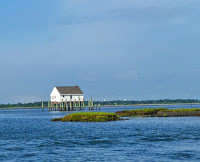 The Chincoteague National Wildlife Refuge is actually on Assateague Island, which lies between Chincoteague and the Atlantic ocean. The refuge contains numerous birds, both resident and migratory, deer, muskrats, rabbits, and of course, feral ponies.
The Chincoteague National Wildlife Refuge is actually on Assateague Island, which lies between Chincoteague and the Atlantic ocean. The refuge contains numerous birds, both resident and migratory, deer, muskrats, rabbits, and of course, feral ponies.The first day there, I could see a herd far off from the road. Fences keep the horses from wandering into the places where people are allowed. The best way to see the horses is from the water.
Booking a trip with Captain Dan's Island Boat Tours had me anticipating even better views. It didn't disappoint.
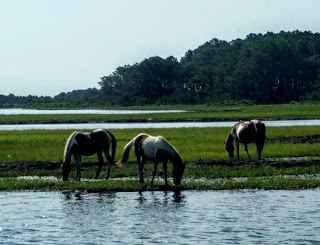
Captain Dan not only knew where to find the horses, but also the names of the stallions and the mares in each band. He could recognize them by their markings and their behavior. Additionally, we saw ospreys, a juvenile bald eagle, three kinds of egrets, pelicans, and great blue and tri-colored herons.
 I was struck by the vast differences between NYC and Chincoteague. I love the great coffee shops, the theatre, the excitement of NYC. Spending time hearing from people like Lee Child and Steve Berry and other bestselling authors is fascinating and helpful and reminds me of the hard work every successful writer has put in to reach the top of our industry. I relished the time spent with up-and-coming authors and the volunteers and the readers, who make what we do possible. Without them we'd have no careers, no conferences, no one to love our work or appreciate our knowledge.
I was struck by the vast differences between NYC and Chincoteague. I love the great coffee shops, the theatre, the excitement of NYC. Spending time hearing from people like Lee Child and Steve Berry and other bestselling authors is fascinating and helpful and reminds me of the hard work every successful writer has put in to reach the top of our industry. I relished the time spent with up-and-coming authors and the volunteers and the readers, who make what we do possible. Without them we'd have no careers, no conferences, no one to love our work or appreciate our knowledge.But I also love the quiet places. The feral landscapes where human beings are the outsiders. Where water and sky come together and land erodes and birds are unconcerned about the catastrophic decisions of men. The reminder that nature will take her course and there's little we can do to stop her. And perhaps, if we listen, we will learn something from the natural world.
That things move forward regardless of our own hopes and dreams. That everything changes around us, whether we want it to or not. That life exists outside the world we make for ourselves and it can be achingly beautiful if we take the time to look. I am humbled by the talent of others, the novels I read that touch my soul, the thrillers that keep me turning pages, the characters I wish I could meet in person. But I am nurtured by nature. I am renewed by still waters. My heart always soars with wild things. How lucky am I to be able to live in both.
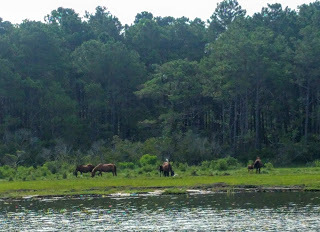
Published on July 24, 2017 12:55
July 12, 2017
The Debutona 500: ITW Debut Author Program
International Thriller Writers is thrilled to announce that as of this summer, more than five hundred writers have been through the Debut Author Program. This year's Debut Author program chair, Elena Hartwell sat down (well, virtually anyway) in conversation with our first Debut Author and our five hundredth Debut Author, to find out a little bit about where we started and where we’re headed.
THE AUTHORS
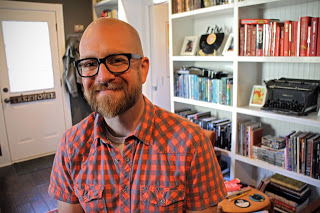 The First ITW Debut Author:
Matt Bronleewe
is a Grammy-nominated songwriter, producer, and author. His name has appeared on over 500 records, amassing sales of over 25 million. His songs have been used by The Walking Dead, Orange Is The New Black, as well as various other tv shows, movies and video games. A founding member of the band Jars of Clay, his credits include producer of the Sinfonia line of digital instruments, owner of Unsecret Music, and co-writer of the current country radio hit “Flatliner” with Cole Swindell & Dierks Bentley. He lives in Nashville, TN with his wife and three children.
The First ITW Debut Author:
Matt Bronleewe
is a Grammy-nominated songwriter, producer, and author. His name has appeared on over 500 records, amassing sales of over 25 million. His songs have been used by The Walking Dead, Orange Is The New Black, as well as various other tv shows, movies and video games. A founding member of the band Jars of Clay, his credits include producer of the Sinfonia line of digital instruments, owner of Unsecret Music, and co-writer of the current country radio hit “Flatliner” with Cole Swindell & Dierks Bentley. He lives in Nashville, TN with his wife and three children.
For more info on Matt, click on his photo or the links below:
Twitter: @mattbronleewe
Instagram: @mattbronleewe
Facebook: /mbronleewe & /mattbronleewe
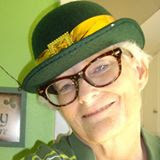 The 500th Debut Author: Lisanne Harrington: Eleven years ago, I left the legal world behind forever so I could pander to my muse, a sarcastic little so-and-so. Only copious amounts of Diet Cherry Dr. Pepper and hamburgers will get him to fill my head with stories of serial killers, werewolves, and the things that live under your bed.
The 500th Debut Author: Lisanne Harrington: Eleven years ago, I left the legal world behind forever so I could pander to my muse, a sarcastic little so-and-so. Only copious amounts of Diet Cherry Dr. Pepper and hamburgers will get him to fill my head with stories of serial killers, werewolves, and the things that live under your bed.
I love to watch reruns of Gilmore Girls, horror movies like Sharknado and Fido, and true crime shows. I like scary clowns, coffee with flavored creamer, and French fries. Lots and lots of French fries.
I live in SoCal with my husband and always-has-to-have-the-last-word Miniature Pinscher, Fiona.
For more information on Lisanne, click on her photo or the links below:
Twitter: @LisaneHarington
Facebook: /lisanne.harrington
Amazon: Author Page
THE INTERVIEW
Matt: I love the idea of shooting questions back and forth. Lisanne, how did you get started? And what led to the release of your debut novel?
Lisanne: Well, let's see ... I was a paralegal for nearly twenty years, until the day an attorney threw a stapler at my head. I knew then it was time to move on. My aim is a lot better than his....
I can't remember a time when I didn't write stories, but it wasn't until 2006 that I decided to get serious about it. And Moonspell was formed.
Elena: Tell us about Moonspell.
Lisanne: Moonspell is the first of the Wolf Creek Mysteries. When townspeople are murdered during the full moon, James Manarro is confronted by his cousin with her suspicions about the identity of the killer—a werewolf. At first, James just laughs it off, but with each vicious murder, he’s forced to admit that she may be right…and one of them might be its next victim.
The others in the trilogy are called Moon Watch and Moon Shadows. I'm also under contract with Black Opal Books for a stand-alone murder mystery called Murder in the Family.
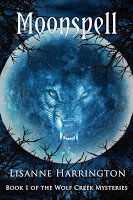
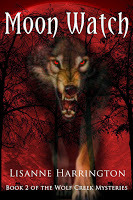
Elena: What about you, Matt? How did you get started?
Matt: My journey started about fifteen years ago. I’d been doing music for around five years—give or take—and I was feeling the itch to explore new creative places. Poetry was the first thing that struck me. Writing poetry was a natural step from writing songs, but while my songs were succeeding, my poetry was not.
After amassing a battalion of poems—all publishable in my mind—my manager arranged a meeting with an author who lived here in Nashville.
He declared my poetry a waste of time, and told me to abandon it before it distracted me from the thing I did best—write and produce songs. His words were sharp, but he honestly wasn’t trying to do me harm. Looking back, I’m glad he wasn’t more tactful, because it quickly made me change my angle. But not in the way he thought.
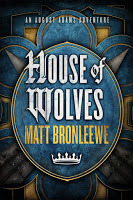
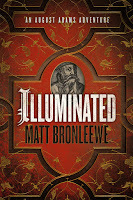 I began writing fiction in earnest. Every night I tried to crank out a few pages. I had no idea where the story was going, but it felt SO GREAT to write. So I just kept writing until one day I realized I’d completed what amounted to a book. A bit slim, but still, it was more words than I’d ever dreamed of stringing together.
I began writing fiction in earnest. Every night I tried to crank out a few pages. I had no idea where the story was going, but it felt SO GREAT to write. So I just kept writing until one day I realized I’d completed what amounted to a book. A bit slim, but still, it was more words than I’d ever dreamed of stringing together.
I was flummoxed at what to do next. I knew I wasn’t going to go back to the author I’d met with previously. To have him squash me down again would be unbearable, so I reached out to someone else, another producer/songwriter who had also authored a few books. This time around, the meeting went much differently than the time before. This new mentor was encouraging, even to the point of connecting me with his publisher.
The publisher left his position at the publishing company and became my agent, with his unbridled enthusiasm and help, he managed to land a multi book deal.
My first book, Illuminated , was the book that got me into ITW. It was followed by a sequel, House of Wolves , before I decided to take a hiatus from the series in order to focus on some other creative goals I had in mind.
Elena: What a journey you’ve been on, Matt. I see your third novel in the series is Man of Action. Congratulations on a trilogy! What else would you like to ask Lisanne?
Matt: I'm excited to dig into Moonspell, and it makes me curious about research habits… What places, whether online or in the real world, are strongholds for you in terms of information? Do you like to interview people? Dig through old volumes and libraries? Sift through endless websites? All of the above? I ask because my stories are often birthed from research.
Lisanne: I have a touch of social anxiety, so interviewing people is fairly difficult for me. What I did for Moonspell was to visit places where teens congregate: MickeyD's, Starbucks, the Mall, *shudders* to listen for current slang terms and issues. I did online research on werewolf legends, including the first recorded appearance. Research also included serial killers (their mindset, nurture vs. nature, etc.), the difference between psychopaths and sociopaths (one uses charm and normally has above-average intelligence while the other tends to be uneducated, highly volatile and easily agitated.)
I do rely heavily on the internet for my research, although sometimes, it can be very satisfying to go old school and go to the library to pour through actual books.
I have a few friends in law enforcement, so I did contact them with certain questions on police procedures, weapons, cruisers, and such.
The way I work, a character usually appears to me and we chat until they feel comfortable enough to tell me their story. That's when I start my research. I can't start before that because I don't know what the story elements might be.
Matt: So interesting to hear your story and your writing methodology. The way you described your conversation with your character, getting comfortable enough for them to tell their story, is fascinating. My encounters with my characters are more “observational,” if I had to try and describe it. Rather than interacting with them in some imagined way, I tend to daydream in “scenes,” seeing my character in action, whether he or she is escaping a burning building or talking his or her way out of a sticky situation. This is probably rooted in my love of movies, and I’ve often been told that my chapters feel quite cinematic—which I’ve taken as a complement ;-)
Elena: I love hearing about both your processes. What about space, do either of you have dedicated writing spots?
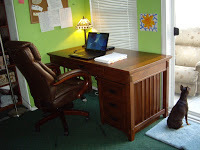 Lisanne: I normally sit in a big recliner in front of the TV. That seems to work best for me when writing or researching. When cleaning up the manuscripts, though, I hide in my room at my desk (TV still blaring!), door closed, with strict instructions to the rest of the house to not bother me unless they are on fire. Everyone but Fiona, my rowdy min pin, respects this. But even though I have a dog bed right next to my desk for her, which she sometimes lays in when she's looking out the slider and surveying her Fifedom, most of the time she either wants to play ball or sit in my lap. Not always the easiest thing to have a 12-pound fireball sitting in your lap as you're trying to write...
Lisanne: I normally sit in a big recliner in front of the TV. That seems to work best for me when writing or researching. When cleaning up the manuscripts, though, I hide in my room at my desk (TV still blaring!), door closed, with strict instructions to the rest of the house to not bother me unless they are on fire. Everyone but Fiona, my rowdy min pin, respects this. But even though I have a dog bed right next to my desk for her, which she sometimes lays in when she's looking out the slider and surveying her Fifedom, most of the time she either wants to play ball or sit in my lap. Not always the easiest thing to have a 12-pound fireball sitting in your lap as you're trying to write...
Are you a pantser or do you outline?
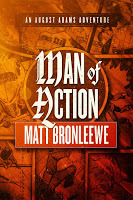 Matt: I’m usually somewhere in-between. Outlining, or at least just sitting down and beginning to write ABOUT the story, helps me think through the tale in greater detail. I usually discover some stumbling blocks during that process, which helps me avoid them during the actual writing. (Of course, other problems crop up later haha!) Inevitably, even when I’ve sketched out a point-by-point outline, I somehow loose control of the characters once I sit down to write. Characters don’t behave! (Do you find this to be true?) I think this is something we as creatives understand that is difficult to relate to those who aren’t active in the arts: YOU DON’T HAVE FULL CONTROL. I don’t know if I’ve found a worthy analogy—riding a wild horse, etc.—but it’s certainly not a mechanical exercise. Have you found that to be true for yourself?
Matt: I’m usually somewhere in-between. Outlining, or at least just sitting down and beginning to write ABOUT the story, helps me think through the tale in greater detail. I usually discover some stumbling blocks during that process, which helps me avoid them during the actual writing. (Of course, other problems crop up later haha!) Inevitably, even when I’ve sketched out a point-by-point outline, I somehow loose control of the characters once I sit down to write. Characters don’t behave! (Do you find this to be true?) I think this is something we as creatives understand that is difficult to relate to those who aren’t active in the arts: YOU DON’T HAVE FULL CONTROL. I don’t know if I’ve found a worthy analogy—riding a wild horse, etc.—but it’s certainly not a mechanical exercise. Have you found that to be true for yourself?
Lisanne: I NEVER have control over them. They just won't let me!
Elena: (Laughing because she knows just how these two feel...) I think we have space for one more question from each of you. What are you working on now?
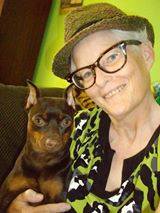 Lisanne: I’m actually working on two stories at the same time. One is a paranormal mystery called Gravelings, and the other is a murder mystery, as yet untitled, that is the first in the Robbie Macfarlane Mysteries. Gravelings is about critters who terrorize a young girl with anxiety and depression issues. Because she is on medication, no one believes her until it is too late.
Lisanne: I’m actually working on two stories at the same time. One is a paranormal mystery called Gravelings, and the other is a murder mystery, as yet untitled, that is the first in the Robbie Macfarlane Mysteries. Gravelings is about critters who terrorize a young girl with anxiety and depression issues. Because she is on medication, no one believes her until it is too late.
The Robbie Macfarlane story is about a writer and her son, who suffers from OCD, who move into a new house in a new town and soon find the body of their next-door neighbor. Everything points to Robbie as the killer. She and her son set about trying to solve the murder.
I also have ideas for six or eight other stories clamoring to be told. Sometimes my brain really hurts!
Matt: On the music side, I’m continuing to write and produce music for artists in just about every category. From the outside that might seem unfocused, but I’ve discovered that underneath all the genre differences, there’s a thread running through it all – STORY. Whether that story is represented by a musical theme, or literally described in the lyrics of a three-minute song, it cuts through everything else and grabs the listener’s attention. Writing fiction was a HUGE HELP in discovering that, and I believe it’s given me a unique point of view in the music world.
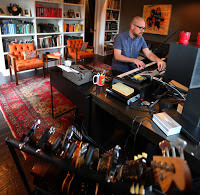
On the writing side, I’ve just finished a tv pilot script called PILGRIM – think “Mad Max” meets “Lost.” We’re still in the pitching phase, but my co-writer and I are excited about the momentum the project is gaining, and we’re planning to develop the concept into a book series too! Speaking of books, I’m finally writing the first draft for a new August Adams thriller called THE SHAKESPEARE CIPHER. This story focuses on a centuries-old literary mystery – the Shakespeare authorship conspiracy. The stakes are global, the secrets are deadly … needless to say I’m having a ton of fun! I’m planning to self-publish, but I’m still open to talking with agents and publishers (wink wink!)
Elena: So much creativity in both your lives, it's been great chatting with you about your careers. I'm looking forward to staying in touch. Thanks for being members of ITW Debut Authors Program!
THE AUTHORS
 The First ITW Debut Author:
Matt Bronleewe
is a Grammy-nominated songwriter, producer, and author. His name has appeared on over 500 records, amassing sales of over 25 million. His songs have been used by The Walking Dead, Orange Is The New Black, as well as various other tv shows, movies and video games. A founding member of the band Jars of Clay, his credits include producer of the Sinfonia line of digital instruments, owner of Unsecret Music, and co-writer of the current country radio hit “Flatliner” with Cole Swindell & Dierks Bentley. He lives in Nashville, TN with his wife and three children.
The First ITW Debut Author:
Matt Bronleewe
is a Grammy-nominated songwriter, producer, and author. His name has appeared on over 500 records, amassing sales of over 25 million. His songs have been used by The Walking Dead, Orange Is The New Black, as well as various other tv shows, movies and video games. A founding member of the band Jars of Clay, his credits include producer of the Sinfonia line of digital instruments, owner of Unsecret Music, and co-writer of the current country radio hit “Flatliner” with Cole Swindell & Dierks Bentley. He lives in Nashville, TN with his wife and three children.For more info on Matt, click on his photo or the links below:
Twitter: @mattbronleewe
Instagram: @mattbronleewe
Facebook: /mbronleewe & /mattbronleewe
 The 500th Debut Author: Lisanne Harrington: Eleven years ago, I left the legal world behind forever so I could pander to my muse, a sarcastic little so-and-so. Only copious amounts of Diet Cherry Dr. Pepper and hamburgers will get him to fill my head with stories of serial killers, werewolves, and the things that live under your bed.
The 500th Debut Author: Lisanne Harrington: Eleven years ago, I left the legal world behind forever so I could pander to my muse, a sarcastic little so-and-so. Only copious amounts of Diet Cherry Dr. Pepper and hamburgers will get him to fill my head with stories of serial killers, werewolves, and the things that live under your bed. I love to watch reruns of Gilmore Girls, horror movies like Sharknado and Fido, and true crime shows. I like scary clowns, coffee with flavored creamer, and French fries. Lots and lots of French fries.
I live in SoCal with my husband and always-has-to-have-the-last-word Miniature Pinscher, Fiona.
For more information on Lisanne, click on her photo or the links below:
Twitter: @LisaneHarington
Facebook: /lisanne.harrington
Amazon: Author Page
THE INTERVIEW
Matt: I love the idea of shooting questions back and forth. Lisanne, how did you get started? And what led to the release of your debut novel?
Lisanne: Well, let's see ... I was a paralegal for nearly twenty years, until the day an attorney threw a stapler at my head. I knew then it was time to move on. My aim is a lot better than his....
I can't remember a time when I didn't write stories, but it wasn't until 2006 that I decided to get serious about it. And Moonspell was formed.
Elena: Tell us about Moonspell.
Lisanne: Moonspell is the first of the Wolf Creek Mysteries. When townspeople are murdered during the full moon, James Manarro is confronted by his cousin with her suspicions about the identity of the killer—a werewolf. At first, James just laughs it off, but with each vicious murder, he’s forced to admit that she may be right…and one of them might be its next victim.
The others in the trilogy are called Moon Watch and Moon Shadows. I'm also under contract with Black Opal Books for a stand-alone murder mystery called Murder in the Family.


Elena: What about you, Matt? How did you get started?
Matt: My journey started about fifteen years ago. I’d been doing music for around five years—give or take—and I was feeling the itch to explore new creative places. Poetry was the first thing that struck me. Writing poetry was a natural step from writing songs, but while my songs were succeeding, my poetry was not.
After amassing a battalion of poems—all publishable in my mind—my manager arranged a meeting with an author who lived here in Nashville.
He declared my poetry a waste of time, and told me to abandon it before it distracted me from the thing I did best—write and produce songs. His words were sharp, but he honestly wasn’t trying to do me harm. Looking back, I’m glad he wasn’t more tactful, because it quickly made me change my angle. But not in the way he thought.

 I began writing fiction in earnest. Every night I tried to crank out a few pages. I had no idea where the story was going, but it felt SO GREAT to write. So I just kept writing until one day I realized I’d completed what amounted to a book. A bit slim, but still, it was more words than I’d ever dreamed of stringing together.
I began writing fiction in earnest. Every night I tried to crank out a few pages. I had no idea where the story was going, but it felt SO GREAT to write. So I just kept writing until one day I realized I’d completed what amounted to a book. A bit slim, but still, it was more words than I’d ever dreamed of stringing together.I was flummoxed at what to do next. I knew I wasn’t going to go back to the author I’d met with previously. To have him squash me down again would be unbearable, so I reached out to someone else, another producer/songwriter who had also authored a few books. This time around, the meeting went much differently than the time before. This new mentor was encouraging, even to the point of connecting me with his publisher.
The publisher left his position at the publishing company and became my agent, with his unbridled enthusiasm and help, he managed to land a multi book deal.
My first book, Illuminated , was the book that got me into ITW. It was followed by a sequel, House of Wolves , before I decided to take a hiatus from the series in order to focus on some other creative goals I had in mind.
Elena: What a journey you’ve been on, Matt. I see your third novel in the series is Man of Action. Congratulations on a trilogy! What else would you like to ask Lisanne?
Matt: I'm excited to dig into Moonspell, and it makes me curious about research habits… What places, whether online or in the real world, are strongholds for you in terms of information? Do you like to interview people? Dig through old volumes and libraries? Sift through endless websites? All of the above? I ask because my stories are often birthed from research.
Lisanne: I have a touch of social anxiety, so interviewing people is fairly difficult for me. What I did for Moonspell was to visit places where teens congregate: MickeyD's, Starbucks, the Mall, *shudders* to listen for current slang terms and issues. I did online research on werewolf legends, including the first recorded appearance. Research also included serial killers (their mindset, nurture vs. nature, etc.), the difference between psychopaths and sociopaths (one uses charm and normally has above-average intelligence while the other tends to be uneducated, highly volatile and easily agitated.)
I do rely heavily on the internet for my research, although sometimes, it can be very satisfying to go old school and go to the library to pour through actual books.
I have a few friends in law enforcement, so I did contact them with certain questions on police procedures, weapons, cruisers, and such.
The way I work, a character usually appears to me and we chat until they feel comfortable enough to tell me their story. That's when I start my research. I can't start before that because I don't know what the story elements might be.
Matt: So interesting to hear your story and your writing methodology. The way you described your conversation with your character, getting comfortable enough for them to tell their story, is fascinating. My encounters with my characters are more “observational,” if I had to try and describe it. Rather than interacting with them in some imagined way, I tend to daydream in “scenes,” seeing my character in action, whether he or she is escaping a burning building or talking his or her way out of a sticky situation. This is probably rooted in my love of movies, and I’ve often been told that my chapters feel quite cinematic—which I’ve taken as a complement ;-)
Elena: I love hearing about both your processes. What about space, do either of you have dedicated writing spots?
 Lisanne: I normally sit in a big recliner in front of the TV. That seems to work best for me when writing or researching. When cleaning up the manuscripts, though, I hide in my room at my desk (TV still blaring!), door closed, with strict instructions to the rest of the house to not bother me unless they are on fire. Everyone but Fiona, my rowdy min pin, respects this. But even though I have a dog bed right next to my desk for her, which she sometimes lays in when she's looking out the slider and surveying her Fifedom, most of the time she either wants to play ball or sit in my lap. Not always the easiest thing to have a 12-pound fireball sitting in your lap as you're trying to write...
Lisanne: I normally sit in a big recliner in front of the TV. That seems to work best for me when writing or researching. When cleaning up the manuscripts, though, I hide in my room at my desk (TV still blaring!), door closed, with strict instructions to the rest of the house to not bother me unless they are on fire. Everyone but Fiona, my rowdy min pin, respects this. But even though I have a dog bed right next to my desk for her, which she sometimes lays in when she's looking out the slider and surveying her Fifedom, most of the time she either wants to play ball or sit in my lap. Not always the easiest thing to have a 12-pound fireball sitting in your lap as you're trying to write...Are you a pantser or do you outline?
 Matt: I’m usually somewhere in-between. Outlining, or at least just sitting down and beginning to write ABOUT the story, helps me think through the tale in greater detail. I usually discover some stumbling blocks during that process, which helps me avoid them during the actual writing. (Of course, other problems crop up later haha!) Inevitably, even when I’ve sketched out a point-by-point outline, I somehow loose control of the characters once I sit down to write. Characters don’t behave! (Do you find this to be true?) I think this is something we as creatives understand that is difficult to relate to those who aren’t active in the arts: YOU DON’T HAVE FULL CONTROL. I don’t know if I’ve found a worthy analogy—riding a wild horse, etc.—but it’s certainly not a mechanical exercise. Have you found that to be true for yourself?
Matt: I’m usually somewhere in-between. Outlining, or at least just sitting down and beginning to write ABOUT the story, helps me think through the tale in greater detail. I usually discover some stumbling blocks during that process, which helps me avoid them during the actual writing. (Of course, other problems crop up later haha!) Inevitably, even when I’ve sketched out a point-by-point outline, I somehow loose control of the characters once I sit down to write. Characters don’t behave! (Do you find this to be true?) I think this is something we as creatives understand that is difficult to relate to those who aren’t active in the arts: YOU DON’T HAVE FULL CONTROL. I don’t know if I’ve found a worthy analogy—riding a wild horse, etc.—but it’s certainly not a mechanical exercise. Have you found that to be true for yourself?Lisanne: I NEVER have control over them. They just won't let me!
Elena: (Laughing because she knows just how these two feel...) I think we have space for one more question from each of you. What are you working on now?
 Lisanne: I’m actually working on two stories at the same time. One is a paranormal mystery called Gravelings, and the other is a murder mystery, as yet untitled, that is the first in the Robbie Macfarlane Mysteries. Gravelings is about critters who terrorize a young girl with anxiety and depression issues. Because she is on medication, no one believes her until it is too late.
Lisanne: I’m actually working on two stories at the same time. One is a paranormal mystery called Gravelings, and the other is a murder mystery, as yet untitled, that is the first in the Robbie Macfarlane Mysteries. Gravelings is about critters who terrorize a young girl with anxiety and depression issues. Because she is on medication, no one believes her until it is too late.The Robbie Macfarlane story is about a writer and her son, who suffers from OCD, who move into a new house in a new town and soon find the body of their next-door neighbor. Everything points to Robbie as the killer. She and her son set about trying to solve the murder.
I also have ideas for six or eight other stories clamoring to be told. Sometimes my brain really hurts!
Matt: On the music side, I’m continuing to write and produce music for artists in just about every category. From the outside that might seem unfocused, but I’ve discovered that underneath all the genre differences, there’s a thread running through it all – STORY. Whether that story is represented by a musical theme, or literally described in the lyrics of a three-minute song, it cuts through everything else and grabs the listener’s attention. Writing fiction was a HUGE HELP in discovering that, and I believe it’s given me a unique point of view in the music world.

On the writing side, I’ve just finished a tv pilot script called PILGRIM – think “Mad Max” meets “Lost.” We’re still in the pitching phase, but my co-writer and I are excited about the momentum the project is gaining, and we’re planning to develop the concept into a book series too! Speaking of books, I’m finally writing the first draft for a new August Adams thriller called THE SHAKESPEARE CIPHER. This story focuses on a centuries-old literary mystery – the Shakespeare authorship conspiracy. The stakes are global, the secrets are deadly … needless to say I’m having a ton of fun! I’m planning to self-publish, but I’m still open to talking with agents and publishers (wink wink!)
Elena: So much creativity in both your lives, it's been great chatting with you about your careers. I'm looking forward to staying in touch. Thanks for being members of ITW Debut Authors Program!
Published on July 12, 2017 00:00
July 9, 2017
Collaboration in Writing: JT Rogers and the Debut Novel "In From The Cold"
If two heads are better than one (not to be confused with Two Heads are Deader Than One) then two writers should be better too! This week I'm thrilled to include a crime writing duo, ITW Debut author J.T. Rogers is actually S.T. Pelletier and Amanda Schuckman. Here they are as my guests, talking about their process and their first novel, In From The Cold
THE AUTHORS
S.T. Pelletier is a recent graduate living in Canada. Amanda Schuckman is a writer and voice actor living in SoCal. Together they are J.T. Rogers , who grew up wanting to be either a superhero or a spy—but rather than pick one over the other, chose to become a writer instead so she could be both in her spare time. Her fiction reflects her childhood obsessions, blending together the distrustful, cloak-and-dagger world of spies with the high-octane action and camaraderie of her favorite superheroes.
The product of a bilingual education and an alumna of a handful of universities, J.T.’s passions include history, comic books, and Shakespeare. She has lived all over North America and loves to weave threads of authentic local color into her stories. Just ask her about Lucy the Elephant.Currently, she’s living the dream of being overworked and underpaid. She writes to stay sane—or that’s the story she likes to tell, at least.
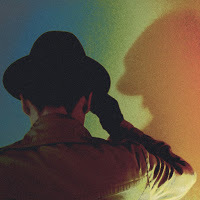 Learn more about J.T. Rogers:
Learn more about J.T. Rogers:
Tumblr: http://jtrogersfiction.tumblr.com/Facebook: https://www.facebook.com/jtrogersficTwitter: https://twitter.com/jtrogersfictionInstagram: https://www.instagram.com/jtrogersfic...
THE BLOG CO-POST
They say two heads are better than one, but that well-worn bit of folksy common sense isn’t typically thought to apply to the world of novel-form storytelling. As a writing team, we’ve encountered a lot of curiosity from our peers—particularly since we share a nom de plum. When we were invited to do a guest spot for today’s lead-up to ThrillerFest, we thought this post was an obvious opportunity to discuss some of the advantages of cowriting.
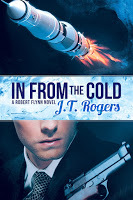 S.T. Pelletier: For me, I think the biggest advantage to having a cowriter is having a built-in sounding board for ideas. I never have to worry about getting stuck. Amanda and I have similar interests but different strengths when it comes to writing, and when we hit our rhythm, it’s amazing how much we can accomplish in a couple of hours. I’m reminded of one of the earliest editing passes for
In from theCold
: Our editor asked to see more from our secondary point-of-view character, Wes, and we were under a tight deadline to deliver a revised manuscript. In the space of a Sunday afternoon, we wrote 4,000 words of new material—a feat I doubt I’d ever have been able to accomplish on my own. I’m a relatively slow writer, but having a writing partner lights a fire under my ass. With an immediate audience to please, for lack of a better word, I’m less concerned about getting the phrasing right so much as I’m eager to get the phrasing down. First and foremost, the story is for us. We get to tell the story to each other first.
S.T. Pelletier: For me, I think the biggest advantage to having a cowriter is having a built-in sounding board for ideas. I never have to worry about getting stuck. Amanda and I have similar interests but different strengths when it comes to writing, and when we hit our rhythm, it’s amazing how much we can accomplish in a couple of hours. I’m reminded of one of the earliest editing passes for
In from theCold
: Our editor asked to see more from our secondary point-of-view character, Wes, and we were under a tight deadline to deliver a revised manuscript. In the space of a Sunday afternoon, we wrote 4,000 words of new material—a feat I doubt I’d ever have been able to accomplish on my own. I’m a relatively slow writer, but having a writing partner lights a fire under my ass. With an immediate audience to please, for lack of a better word, I’m less concerned about getting the phrasing right so much as I’m eager to get the phrasing down. First and foremost, the story is for us. We get to tell the story to each other first.
A. Schuckman:That’s an excellent way of putting it. When I’m writing alone, I will get hung up on how to move into the next moment of a scene for months, or be stymied by a passage that doesn’t lead where I want it to. Having Sarah at the ready to suggest something or even remind me of something we’d discussed previously, it keeps me from getting stuck. There’s also a wonderful security in knowing a writing partner’s process and strengths, or even just how they think, because I can leave things blank and not panic about doing so, knowing that Sarah will get what I’m aiming at and be able to help me fill that blank in. I will literally put placeholder text in brackets describing what needs to go there and move along to keep up momentum, something I haven’t managed to trick myself into doing in solo work.
There’s also the added benefit of having to think things through and be able to explain them to another person before you can dive in. If I have an idea or the spark of something I really like, but haven’t followed that through to any kind of end point, I can get mired in detail and character and increasingly elaborate justifications for those things, long before I figure out the idea just doesn’t work the way I wanted it to. When we have to walk each other through those ideas, it makes the process of adjusting them, fixing them, making them better and making them work much faster and less painful.
S.T. Pelletier: As a writing team, our most frequently asked questions are usually about our process. I’m not really sure how other writing teams collaborate, but our process relies heavily on technology because we don’t even live in the same country, let alone the same time zone. (At time of writing, we have only actually met in person once, about six years ago, for under six hours.) We always start with a conversation, usually over instant message. One of us will have an idea, and that idea quickly becomes a game of ‘Yes, and…’, with each of us taking up characters on the fly as we craft the rough beats of a story. Because we’re huge nerds, we pretty much do this every day, but when we’re particularly taken with an idea, I’ll copy and paste the chat transcript into a Google Doc. From there, we’ll create a skeleton of the story—basically a barebones outline to get us from start to the finish. After that, the story gets broken down chapter by chapter. Our outline for In from the Cold was about 20 or so pages. Each chapter then receives its own document in a shared file. We’ll copy and paste the relevant notes from the outline, and then write out the full chapter. Sometimes we stay very close to the outline. Other times we ad lib an entirely new subplot.
A. Schuckman: I don’t know how other writing partners do it, but this system has proved incredibly fruitful for us. It allows us to track how ideas evolve, to shelve and catalog obsolete versions of things that we can then mine for good language later, and it allows for incredible flexibility. We write until we’re stuck or satisfied and then shoot each other a quick ‘tag!’, tapping in and out as each chapter progresses. The final work is, as a result, deeply collaborative. Our styles of writing are quite different, but with In from the Cold especially, using pulp thrillers as a guidepost, the close back and forth of the process helped us match and blend our voices.
S.T. Pelletier: We each tend to favour certain characters—Amanda wrote all of Flynn’s dialogue, for example, while I wrote all of Wes’s—but other than that, there are no hard and fast distinctions. Amanda’s better at spatial descriptions than I am, so I usually leave a placeholder for her to fill when she’s online, but I love writing action scenes, so I take care of those. Once the first draft is complete, we start piecing together the entire story in one single document. I work as a freelance editor, so I do the first pass, and then Amanda follows with her notes and adjustments. Then I do one final pass and ship it off to the editors!
A. Schuckman:We were pretty thrilled with the minimal grammatical notes we got back. Having another set of eyes constantly reading and rereading your writing as you write means a lot of typos and oddities get caught—and fixed—instantly. It’s also a lot less daunting to go through notes when you have backup right there, someone to divide and conquer the feedback with.
S.T. Pelletier: Ultimately, the thing I like best about cowriting is that it takes a traditionally solitary activity and turns it into one I can share with a friend. Time zones and technology can get tricky sometimes, but the benefits far outweigh the disadvantages.
A. Schuckman:There is something fundamentally important about sharing stories, and having a partner means you’re doing that, for a receptive audience, constantly. It also means you are being the given the gift of someone else’s storytelling with that same frequency. Every time Sarah taps me to jump back into the document we’re working on, I’m excited to see what’s there, what’s new, how she’s moved the story along, and am inspired to do the same, in turn.
Such an interesting process. Thank you both for letting us get a glimpse inside J.T. Rogers.
Lots of big things this week! Don't miss my interview with our first and 500th ITW Debut Author (posting July 12) and my posts from ThrillerFest in NYC next weekend. See you all soon!
THE AUTHORS
S.T. Pelletier is a recent graduate living in Canada. Amanda Schuckman is a writer and voice actor living in SoCal. Together they are J.T. Rogers , who grew up wanting to be either a superhero or a spy—but rather than pick one over the other, chose to become a writer instead so she could be both in her spare time. Her fiction reflects her childhood obsessions, blending together the distrustful, cloak-and-dagger world of spies with the high-octane action and camaraderie of her favorite superheroes.
The product of a bilingual education and an alumna of a handful of universities, J.T.’s passions include history, comic books, and Shakespeare. She has lived all over North America and loves to weave threads of authentic local color into her stories. Just ask her about Lucy the Elephant.Currently, she’s living the dream of being overworked and underpaid. She writes to stay sane—or that’s the story she likes to tell, at least.
 Learn more about J.T. Rogers:
Learn more about J.T. Rogers:Tumblr: http://jtrogersfiction.tumblr.com/Facebook: https://www.facebook.com/jtrogersficTwitter: https://twitter.com/jtrogersfictionInstagram: https://www.instagram.com/jtrogersfic...
THE BLOG CO-POST
They say two heads are better than one, but that well-worn bit of folksy common sense isn’t typically thought to apply to the world of novel-form storytelling. As a writing team, we’ve encountered a lot of curiosity from our peers—particularly since we share a nom de plum. When we were invited to do a guest spot for today’s lead-up to ThrillerFest, we thought this post was an obvious opportunity to discuss some of the advantages of cowriting.
 S.T. Pelletier: For me, I think the biggest advantage to having a cowriter is having a built-in sounding board for ideas. I never have to worry about getting stuck. Amanda and I have similar interests but different strengths when it comes to writing, and when we hit our rhythm, it’s amazing how much we can accomplish in a couple of hours. I’m reminded of one of the earliest editing passes for
In from theCold
: Our editor asked to see more from our secondary point-of-view character, Wes, and we were under a tight deadline to deliver a revised manuscript. In the space of a Sunday afternoon, we wrote 4,000 words of new material—a feat I doubt I’d ever have been able to accomplish on my own. I’m a relatively slow writer, but having a writing partner lights a fire under my ass. With an immediate audience to please, for lack of a better word, I’m less concerned about getting the phrasing right so much as I’m eager to get the phrasing down. First and foremost, the story is for us. We get to tell the story to each other first.
S.T. Pelletier: For me, I think the biggest advantage to having a cowriter is having a built-in sounding board for ideas. I never have to worry about getting stuck. Amanda and I have similar interests but different strengths when it comes to writing, and when we hit our rhythm, it’s amazing how much we can accomplish in a couple of hours. I’m reminded of one of the earliest editing passes for
In from theCold
: Our editor asked to see more from our secondary point-of-view character, Wes, and we were under a tight deadline to deliver a revised manuscript. In the space of a Sunday afternoon, we wrote 4,000 words of new material—a feat I doubt I’d ever have been able to accomplish on my own. I’m a relatively slow writer, but having a writing partner lights a fire under my ass. With an immediate audience to please, for lack of a better word, I’m less concerned about getting the phrasing right so much as I’m eager to get the phrasing down. First and foremost, the story is for us. We get to tell the story to each other first. A. Schuckman:That’s an excellent way of putting it. When I’m writing alone, I will get hung up on how to move into the next moment of a scene for months, or be stymied by a passage that doesn’t lead where I want it to. Having Sarah at the ready to suggest something or even remind me of something we’d discussed previously, it keeps me from getting stuck. There’s also a wonderful security in knowing a writing partner’s process and strengths, or even just how they think, because I can leave things blank and not panic about doing so, knowing that Sarah will get what I’m aiming at and be able to help me fill that blank in. I will literally put placeholder text in brackets describing what needs to go there and move along to keep up momentum, something I haven’t managed to trick myself into doing in solo work.
There’s also the added benefit of having to think things through and be able to explain them to another person before you can dive in. If I have an idea or the spark of something I really like, but haven’t followed that through to any kind of end point, I can get mired in detail and character and increasingly elaborate justifications for those things, long before I figure out the idea just doesn’t work the way I wanted it to. When we have to walk each other through those ideas, it makes the process of adjusting them, fixing them, making them better and making them work much faster and less painful.
S.T. Pelletier: As a writing team, our most frequently asked questions are usually about our process. I’m not really sure how other writing teams collaborate, but our process relies heavily on technology because we don’t even live in the same country, let alone the same time zone. (At time of writing, we have only actually met in person once, about six years ago, for under six hours.) We always start with a conversation, usually over instant message. One of us will have an idea, and that idea quickly becomes a game of ‘Yes, and…’, with each of us taking up characters on the fly as we craft the rough beats of a story. Because we’re huge nerds, we pretty much do this every day, but when we’re particularly taken with an idea, I’ll copy and paste the chat transcript into a Google Doc. From there, we’ll create a skeleton of the story—basically a barebones outline to get us from start to the finish. After that, the story gets broken down chapter by chapter. Our outline for In from the Cold was about 20 or so pages. Each chapter then receives its own document in a shared file. We’ll copy and paste the relevant notes from the outline, and then write out the full chapter. Sometimes we stay very close to the outline. Other times we ad lib an entirely new subplot.
A. Schuckman: I don’t know how other writing partners do it, but this system has proved incredibly fruitful for us. It allows us to track how ideas evolve, to shelve and catalog obsolete versions of things that we can then mine for good language later, and it allows for incredible flexibility. We write until we’re stuck or satisfied and then shoot each other a quick ‘tag!’, tapping in and out as each chapter progresses. The final work is, as a result, deeply collaborative. Our styles of writing are quite different, but with In from the Cold especially, using pulp thrillers as a guidepost, the close back and forth of the process helped us match and blend our voices.
S.T. Pelletier: We each tend to favour certain characters—Amanda wrote all of Flynn’s dialogue, for example, while I wrote all of Wes’s—but other than that, there are no hard and fast distinctions. Amanda’s better at spatial descriptions than I am, so I usually leave a placeholder for her to fill when she’s online, but I love writing action scenes, so I take care of those. Once the first draft is complete, we start piecing together the entire story in one single document. I work as a freelance editor, so I do the first pass, and then Amanda follows with her notes and adjustments. Then I do one final pass and ship it off to the editors!
A. Schuckman:We were pretty thrilled with the minimal grammatical notes we got back. Having another set of eyes constantly reading and rereading your writing as you write means a lot of typos and oddities get caught—and fixed—instantly. It’s also a lot less daunting to go through notes when you have backup right there, someone to divide and conquer the feedback with.
S.T. Pelletier: Ultimately, the thing I like best about cowriting is that it takes a traditionally solitary activity and turns it into one I can share with a friend. Time zones and technology can get tricky sometimes, but the benefits far outweigh the disadvantages.
A. Schuckman:There is something fundamentally important about sharing stories, and having a partner means you’re doing that, for a receptive audience, constantly. It also means you are being the given the gift of someone else’s storytelling with that same frequency. Every time Sarah taps me to jump back into the document we’re working on, I’m excited to see what’s there, what’s new, how she’s moved the story along, and am inspired to do the same, in turn.
Such an interesting process. Thank you both for letting us get a glimpse inside J.T. Rogers.
Lots of big things this week! Don't miss my interview with our first and 500th ITW Debut Author (posting July 12) and my posts from ThrillerFest in NYC next weekend. See you all soon!
Published on July 09, 2017 00:00
July 2, 2017
Debut Author, David Eric Tomlinson on Kenpo, Children, and Writing His Second Novel
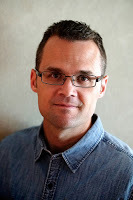 Thrilled to introduce all of you to ITW Debut Author, David Eric Tomlinson.
Thrilled to introduce all of you to ITW Debut Author, David Eric Tomlinson.
In David's debut novel, The Midnight Man, Dean Goodnight, the first Choctaw Indian employed by the Oklahoma County public defender's office, pulls a new case—the brutal murder of a once-promising basketball star. The only witness is Caleb, the five-year-old son of the prime suspect. Investigating the murder, Dean draws four strangers into his client's orbit, each of whom becomes deeply involved in the case—and in Caleb's fate.
To learn more about David, find him online!
Web Site: http://www.daviderictomlinson.com/Facebook Page: http://www.facebook.com/AuthorDavidEricTomlinson/Goodreads: http://www.goodreads.com/DavidEricTomlinson
The Interview
Your debut novel, The Midnight Man centers on five diverse characters, racially, economically, and socially. What compelled you to create such a complex set of characters?
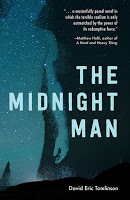 I grew up in the town of Perry, Oklahoma, where, on April 19, 1995, Timothy McVeigh was pulled over for driving through town without license plates. My first drafts of the novel were an attempt to write a kind of thriller about the Oklahoma City bombing.
I grew up in the town of Perry, Oklahoma, where, on April 19, 1995, Timothy McVeigh was pulled over for driving through town without license plates. My first drafts of the novel were an attempt to write a kind of thriller about the Oklahoma City bombing. But it wasn't working ... it was too dark, too ugly. What I wound up doing instead was taking the social and political forces of that time and place - flyover country, at the turn of the century - and personifying them. As history converges on tragedy, these five characters overcome their racial, social, and political differences to form a kind of family unit. It's a much more hopeful story, in the end. You realize that, because the characters have spent the whole book coming together, they will be okay, in the end. At the level of the personal, tragedy doesn't have to be inevitable.
You were born and raised in Oklahoma, but went to college in San Diego. What brought you all the way to the west coast for your education? What was that change like?
I was a teenager and wanted to see more of the world. The transition wasn't that difficult, though I did have to work at losing my Okie accent (it was a constant source of amusement to roommates, friends, etc).
I'm glad I left for California. I met my wife there, during the first week of school, and today we have two beautiful teenage daughters. Now that I'm older, though, and living in the sprawl of Dallas, I find myself missing the quiet, laid-back pace of small town Oklahoma. (Part of why I asked David this question is I went from San Diego to Seattle to Athens, Georgia for graduate school, so I was curious about his "reverse" situation. I will say, I was often told I spoke way too fast for Georgia!)
How has parenthood impacted your writing? You included a young boy in the novel, is it easier or harder to write about children in difficult situations having children of your own?
Parenthood has dramatically impacted both what I write, and how I write it. One of the characters in this book is an empty nester, a woman in her 60s whose children have all moved on - to careers and children of their own. I couldn't have written that character without experiencing parenting first-hand.
As a Kenpo Karate instructor, you understand discipline. Are you also disciplined as a writer? Is that a natural state for you? or do you find that area of your life brings out a messy side?
I go through phases. I do try to write and read every day, but some days are more productive than others. Most of my better ideas come to me when I'm out walking - around the neighborhood, to and from the gym, on long walks around the lake, etc. There is something about the act of moving through physical space and time that summons the muse.
I tend to get less disciplined in other areas of life when I'm close to completing something. The last third or so of a book, life becomes an obsessive sprint to finish the story. It's not very healthy, and not something I can sustain for long. It's the situation I'm in right now ... just a few weeks away from completing another novel. (Congratulations! So excited for you to be finishing up your next book)
You also write short stories, how does that process differ from writing a novel?
I've decided that I'm not very good at writing short stories. When I first became serious about writing, I would work on them to practice my craft. But there is a kind of Jedi mind trick to great short story - a sudden reversal or focus or shift - that I haven't yet mastered.For me, writing a novel is about focus, belief, and balance. You need balance in your physical and emotional world to sustain that focus for year after year. And I've learned to believe in the decisions I made weeks or months ago. The process has to be its own reward, because it's entirely possible that the final product might not ever see the light of day. So now I write, not for some imagined market or audience, but from the heart.
What are you working on now?
Right now I'm almost done with the first draft of a novel about an Army veteran who runs a suicide hotline for other veterans. (Sadly, very timely.)
Final Words of Wisdom:
Read every day. Write every day. Find a mentor or editor who can be tough on you, and inspire you to try harder. Do those three things, and you'll be creating work that you're proud of, and that others will want to read. (Great final words, thanks for spending time with me and my readers!)
Published on July 02, 2017 00:00
June 25, 2017
Author Alexia Gordon: Balancing a Medical Career with a Writing Career, and Picking up a Lefty Award Along the Way
 This week I got to hang out with ITW Debut Author Alexia Gordon. Here's Alexia in her own words...
This week I got to hang out with ITW Debut Author Alexia Gordon. Here's Alexia in her own words...A writer since childhood, I put literary endeavors on hold to finish medical school and Family Medicine residency training. Medical career established, I returned to writing fiction. I completed SMU's Writer’s Path program in Dallas, Texas. Henery Presspublished my first novel, Murder in G Major , book one of the Gethsemane Brown mysteries, in September 2016. Book two, Death in D Minor, releases July 11, 2017.
Murder in G Major won the Lefty Award for Best Debut Novel, was nominated for an Agatha Award for Best New Novel, and was selected one of Suspense Magazine's Best Debuts.
I listen to classical music, drink whiskey, and blog at www.missdemeanors.com, voted one of Writers' Digest magazine's 101 best websites for writers.
You are a medical doctor and now a novelist, how do those two careers intersect?I keep my medical and writing careers separate. As a family physician in full-time clinical practice I was too close to medicine to write about it. I'd go off on rants about the frustrations of primary care instead of telling a story. However, now that I've transitioned from the clinical side of the house to the administrative side, I may try again to write about medicine. I'm out of the trenches and the distance helps me maintain perspective. Giving up clinical practice also provided me with regular hours and a more predictable schedule so I'm able to juggle two jobs. I don't write novels while I'm at my day job (the Feds frown on doing non-government work on government time) but my day has a set end-time and I don't work weekends or holidays so I can plan my writing. Mysteries and medicine do share a commonality for me. My love of solving puzzles and fixing problems drew me toward both.
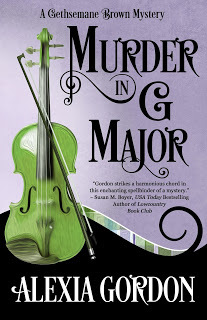 You have had a lot of critical success with your first novel, how has that impacted you?Critical success with my first novel created a lot of anxiety about my second. I suffered a major case of Imposter Syndrome—I don't really belong here, I don't really deserve these accolades, I can't really do this, etc. Self-doubt and fears about failing to live up to expectations moved in and resisted eviction. The bar seemed so high for book 2, I struggled to write it. But, with the help of my editors (Thanks, Rachel and Erin) I managed to finish book 2. Book 3 was much easier to write.
You have had a lot of critical success with your first novel, how has that impacted you?Critical success with my first novel created a lot of anxiety about my second. I suffered a major case of Imposter Syndrome—I don't really belong here, I don't really deserve these accolades, I can't really do this, etc. Self-doubt and fears about failing to live up to expectations moved in and resisted eviction. The bar seemed so high for book 2, I struggled to write it. But, with the help of my editors (Thanks, Rachel and Erin) I managed to finish book 2. Book 3 was much easier to write. You've lived around the US and love to travel, but what made you choose to set your series in a small town in Ireland?I describe myself as a Hibernophile. I love Irish music, history, whiskey, sports, accents, culture, geography. But I didn't consciously choose to set my story in Ireland. My story chose the setting. When the idea came into my head, Ireland was a part of it. English village mysteries, like Midsomer Murders and Miss Marple, influenced the small town setting. Small towns seem innocuous on the surface, charming and warm and Normal Rockwell-ish. But the bright and shiny veneer often hides some pretty twisted stuff.
Your protagonist, Gesthemane Brown, has a very unusual sidekick, a rather debonair ghost. What draws you to ghost stories, and what do you believe happens to us after we die?I've always loved ghost stories and horror stories, even as a kid. Maybe because scary things contained within the covers of a book or the edges of a screen aren't really that scary. They're reduced to a manageable size. They're controllable. And they're not real. Close the book, turn off the TV, turn up the lights, the boogeyman's gone and it's safe to go home. Unlike real life where you can't control or predict the action and the boogeyman looks like the guy next door. What happens when we die? No comment, other than to say I'm a confirmed Episcopalian.
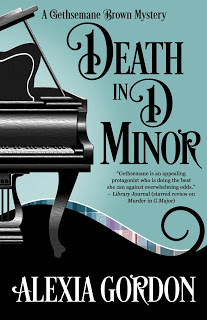 Music is important to you and your characters. Did you grow up in a musical household? Are you a musician yourself? No, I didn't grow up in a musical household. I grew up with a mom who never got to take piano lessons as a kid which meant I got to take them from elementary school all the way through high school. I learned technical things, like how to read notes, but I don't have any real musical talent. In addition to the piano, I played the saxophone and violin for a little while but, because I was a kid and music was just something to try, not a calling, I didn't stick with it. Looking back, I wish I'd appreciated the music lessons more than I did but I can say that about a lot of things that my mother swore were "good for me" but seemed like chores more than fun. These days, I call myself a "music patron". Someone has to buy the concert tickets, right? I'm a symphony season subscriber. I also donate to musical organizations, like the Anchorage Symphony Orchestra's Musica Nova program. They raise money to commission or co-commission a new orchestral work every year.
Music is important to you and your characters. Did you grow up in a musical household? Are you a musician yourself? No, I didn't grow up in a musical household. I grew up with a mom who never got to take piano lessons as a kid which meant I got to take them from elementary school all the way through high school. I learned technical things, like how to read notes, but I don't have any real musical talent. In addition to the piano, I played the saxophone and violin for a little while but, because I was a kid and music was just something to try, not a calling, I didn't stick with it. Looking back, I wish I'd appreciated the music lessons more than I did but I can say that about a lot of things that my mother swore were "good for me" but seemed like chores more than fun. These days, I call myself a "music patron". Someone has to buy the concert tickets, right? I'm a symphony season subscriber. I also donate to musical organizations, like the Anchorage Symphony Orchestra's Musica Nova program. They raise money to commission or co-commission a new orchestral work every year.What are you working on now?I am editing Gethsemane Brown book 3, A Killing in C Sharp.
Final Words of Wisdom:
Finish the manuscript. Even if it's crap, it's a start. You have nothing to edit or submit if you have no manuscript.
Published on June 25, 2017 00:00
June 18, 2017
Jennifer Soosar, Debut Author Finds Suspense in the Classroom
Introducing ITW Debut Author Jennifer Soosar. She's joining me this week to talk about her experiences writing her first novel.
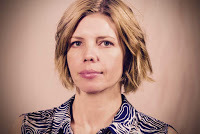 Jennifer Soosar watched too much 'America's Most Wanted' growing up and has been writing about shady characters ever since. She was born and raised in Toronto and has a degree in anthropology from York University. Her short fiction has appeared in Ellery Queen Mystery Magazine.
Jennifer Soosar watched too much 'America's Most Wanted' growing up and has been writing about shady characters ever since. She was born and raised in Toronto and has a degree in anthropology from York University. Her short fiction has appeared in Ellery Queen Mystery Magazine.
She is a member of International Thriller Writers, the Crime Writers of Canada, and Sisters in Crime.
For more information about Jennifer, you can find her online at:
Twitter: @jensoosar
Facebook: @parentteacherassociationnovel
Tell us about the road you took to write and publish your first novel, Parent Teacher Association.
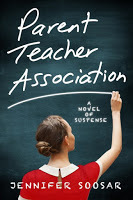 Since childhood, I had written a lot of screenplays and short stories, but never a novel. A novel always seemed like such a daunting project. “I’ll get around to it one day,” I told myself. Once my kids were older, I discovered I had more free time so it seemed like the best opportunity to finally give it a try. The first idea that popped into my head was “why not set the story in an elementary school?” I outlined a basic story with conflict between two characters—a parent and a teacher. The whole thing grew as my imagination took the concept to a much darker place than your typical school environment, but I think that’s what makes it fun. I can admit, I was a bit of a ‘helicopter mom’ (like my parent character Naomi) when my kids were little. I had some fears letting them go out into the world. Writing the novel allowed me to purge a lot of that.
Since childhood, I had written a lot of screenplays and short stories, but never a novel. A novel always seemed like such a daunting project. “I’ll get around to it one day,” I told myself. Once my kids were older, I discovered I had more free time so it seemed like the best opportunity to finally give it a try. The first idea that popped into my head was “why not set the story in an elementary school?” I outlined a basic story with conflict between two characters—a parent and a teacher. The whole thing grew as my imagination took the concept to a much darker place than your typical school environment, but I think that’s what makes it fun. I can admit, I was a bit of a ‘helicopter mom’ (like my parent character Naomi) when my kids were little. I had some fears letting them go out into the world. Writing the novel allowed me to purge a lot of that.
While hammering out the first draft during the late summer of 2014, I was excited to learn about the annual ThrillerFest conference in New York. One of the best things about it was PitchFest, an opportunity to pitch your novel to literary agents. I quickly signed up for the next one in July 2015 because I wanted to give myself a hard deadline. I now had nine months to produce an 80,000 word manuscript I could sit across from agents and pitch. There was no going back now. I had to finish this book…and it had to be good!
The deadline weighed constantly on me. Between mini-panic attacks of “what have I done?” to doubts that I could deliver, the deadline ended up being the best favor I could have done for myself. There was absolutely no way out (well, technically, I could have cancelled the whole thing and gotten my money back but that would’ve sucked). I had to ignore the negative, skeptical thoughts and just keep pounding the novel out. Months went by and it started to take shape. By late June 2015, I finished what was probably the fifth or sixth draft of it. It was finally ready. It was time to head down to New York City.
ThrillerFest was an amazing, positive experience and I learned so much. I ended up pitching Parent Teacher Association to ten different agents and nine of them asked to see more. While I didn’t end up landing an agent, I did meet a fellow author who was published at Black Opal Books. Later in the fall, I queried a few publishers, including Black Opal. Five months later, in March 2016, the acquisitions editor at Black Opal said she was delighted with Parent Teacher Association and wanted to publish it. I got a contract in the mail a few days later.
To return to ThrillerFest in 2017 as a Debut Author is an amazing, satisfying feeling. Every bit of hard work, sweat, and tears was worth it to get here. It’s also great to be on the other side of the project, stepping into a brand new world as an official, published author.
What are you working on now?
 I’m working on a crime novella called Cayo Cuba. It’s a noir-suspense set on the tiny island of Cayo Guillermo on Cuba’s north shore. I’ve travelled there four times and was inspired by the resort workers and the fact that Ernest Hemingway had spent time on the island. In fact, Cuba’s best beach, located on the tip of Cayo Guillermo, and is named after Hemingway’s boat, Pilar.The tagline: ‘A mysterious blonde manipulates a restless dancer to perform a dirty deed in exchange for freedom.’
I’m working on a crime novella called Cayo Cuba. It’s a noir-suspense set on the tiny island of Cayo Guillermo on Cuba’s north shore. I’ve travelled there four times and was inspired by the resort workers and the fact that Ernest Hemingway had spent time on the island. In fact, Cuba’s best beach, located on the tip of Cayo Guillermo, and is named after Hemingway’s boat, Pilar.The tagline: ‘A mysterious blonde manipulates a restless dancer to perform a dirty deed in exchange for freedom.’
I realize it’s an uphill battle for a new author to find readers and fans so I’m writing Cayo Cuba as a promotional giveaway for Parent Teacher Association (with an excerpt and buy link at the end!) I plan to have this novella ready for Bouchercon which takes place this coming October in my hometown of Toronto.
Final words of wisdom?
Inspiration for stories is everywhere, and ideas come in little scraps. You gather up these scraps, combine them and your imagination turns them into a bigger idea. Since there’s no predicting when a scrap of an idea will come, you always carry a small notebook with you. I love mixing unrelated scraps of ideas because the outcome can be something you never would have thought of.
 Jennifer Soosar watched too much 'America's Most Wanted' growing up and has been writing about shady characters ever since. She was born and raised in Toronto and has a degree in anthropology from York University. Her short fiction has appeared in Ellery Queen Mystery Magazine.
Jennifer Soosar watched too much 'America's Most Wanted' growing up and has been writing about shady characters ever since. She was born and raised in Toronto and has a degree in anthropology from York University. Her short fiction has appeared in Ellery Queen Mystery Magazine.
She is a member of International Thriller Writers, the Crime Writers of Canada, and Sisters in Crime.
For more information about Jennifer, you can find her online at:
Twitter: @jensoosar
Facebook: @parentteacherassociationnovel
Tell us about the road you took to write and publish your first novel, Parent Teacher Association.
 Since childhood, I had written a lot of screenplays and short stories, but never a novel. A novel always seemed like such a daunting project. “I’ll get around to it one day,” I told myself. Once my kids were older, I discovered I had more free time so it seemed like the best opportunity to finally give it a try. The first idea that popped into my head was “why not set the story in an elementary school?” I outlined a basic story with conflict between two characters—a parent and a teacher. The whole thing grew as my imagination took the concept to a much darker place than your typical school environment, but I think that’s what makes it fun. I can admit, I was a bit of a ‘helicopter mom’ (like my parent character Naomi) when my kids were little. I had some fears letting them go out into the world. Writing the novel allowed me to purge a lot of that.
Since childhood, I had written a lot of screenplays and short stories, but never a novel. A novel always seemed like such a daunting project. “I’ll get around to it one day,” I told myself. Once my kids were older, I discovered I had more free time so it seemed like the best opportunity to finally give it a try. The first idea that popped into my head was “why not set the story in an elementary school?” I outlined a basic story with conflict between two characters—a parent and a teacher. The whole thing grew as my imagination took the concept to a much darker place than your typical school environment, but I think that’s what makes it fun. I can admit, I was a bit of a ‘helicopter mom’ (like my parent character Naomi) when my kids were little. I had some fears letting them go out into the world. Writing the novel allowed me to purge a lot of that. While hammering out the first draft during the late summer of 2014, I was excited to learn about the annual ThrillerFest conference in New York. One of the best things about it was PitchFest, an opportunity to pitch your novel to literary agents. I quickly signed up for the next one in July 2015 because I wanted to give myself a hard deadline. I now had nine months to produce an 80,000 word manuscript I could sit across from agents and pitch. There was no going back now. I had to finish this book…and it had to be good!
The deadline weighed constantly on me. Between mini-panic attacks of “what have I done?” to doubts that I could deliver, the deadline ended up being the best favor I could have done for myself. There was absolutely no way out (well, technically, I could have cancelled the whole thing and gotten my money back but that would’ve sucked). I had to ignore the negative, skeptical thoughts and just keep pounding the novel out. Months went by and it started to take shape. By late June 2015, I finished what was probably the fifth or sixth draft of it. It was finally ready. It was time to head down to New York City.
ThrillerFest was an amazing, positive experience and I learned so much. I ended up pitching Parent Teacher Association to ten different agents and nine of them asked to see more. While I didn’t end up landing an agent, I did meet a fellow author who was published at Black Opal Books. Later in the fall, I queried a few publishers, including Black Opal. Five months later, in March 2016, the acquisitions editor at Black Opal said she was delighted with Parent Teacher Association and wanted to publish it. I got a contract in the mail a few days later.
To return to ThrillerFest in 2017 as a Debut Author is an amazing, satisfying feeling. Every bit of hard work, sweat, and tears was worth it to get here. It’s also great to be on the other side of the project, stepping into a brand new world as an official, published author.
What are you working on now?
 I’m working on a crime novella called Cayo Cuba. It’s a noir-suspense set on the tiny island of Cayo Guillermo on Cuba’s north shore. I’ve travelled there four times and was inspired by the resort workers and the fact that Ernest Hemingway had spent time on the island. In fact, Cuba’s best beach, located on the tip of Cayo Guillermo, and is named after Hemingway’s boat, Pilar.The tagline: ‘A mysterious blonde manipulates a restless dancer to perform a dirty deed in exchange for freedom.’
I’m working on a crime novella called Cayo Cuba. It’s a noir-suspense set on the tiny island of Cayo Guillermo on Cuba’s north shore. I’ve travelled there four times and was inspired by the resort workers and the fact that Ernest Hemingway had spent time on the island. In fact, Cuba’s best beach, located on the tip of Cayo Guillermo, and is named after Hemingway’s boat, Pilar.The tagline: ‘A mysterious blonde manipulates a restless dancer to perform a dirty deed in exchange for freedom.’ I realize it’s an uphill battle for a new author to find readers and fans so I’m writing Cayo Cuba as a promotional giveaway for Parent Teacher Association (with an excerpt and buy link at the end!) I plan to have this novella ready for Bouchercon which takes place this coming October in my hometown of Toronto.
Final words of wisdom?
Inspiration for stories is everywhere, and ideas come in little scraps. You gather up these scraps, combine them and your imagination turns them into a bigger idea. Since there’s no predicting when a scrap of an idea will come, you always carry a small notebook with you. I love mixing unrelated scraps of ideas because the outcome can be something you never would have thought of.
Published on June 18, 2017 00:00

